

How to Write a Compelling Pharmacy School Personal Statement
Written by Kelly Tomory
July 12, 2022
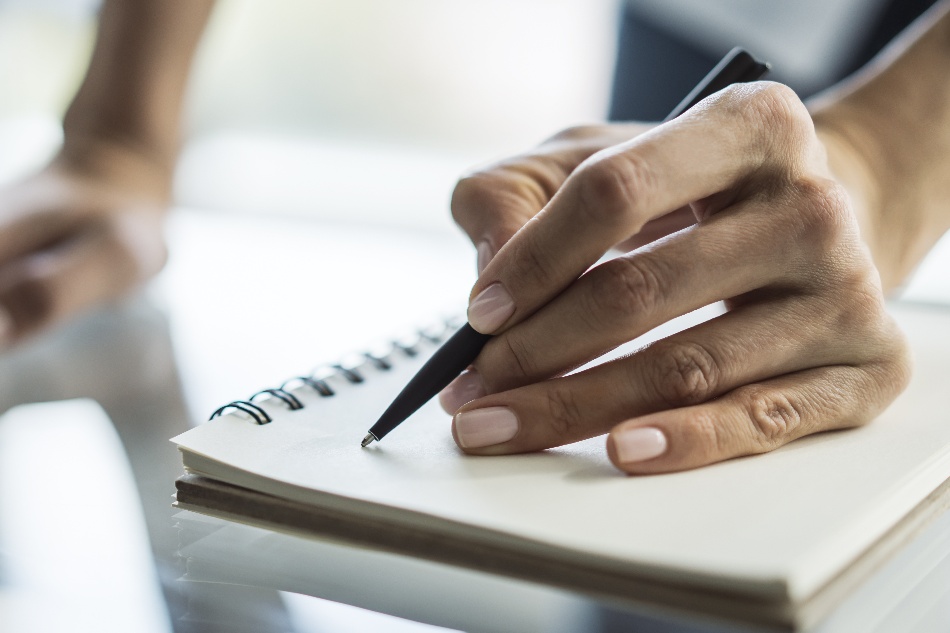
If you’re applying to any higher education program, you’re most likely going to run into something called a “personal statement”. Pharmacy school is no exception, and learning how to write a compelling and unique personal statement is a key part in getting accepted to school. Read on to find out how to write one that stands out!
What is a Personal Statement?
A personal statement serves as a way to highlight your skills, interests and experiences. Personal statements tend to be somewhat autobiographical, but it is not just a lengthy personal essay of your entire life story.
Personal statements are also not a regurgitation of all the information you’ve already included in your application and cover letter. Think of your personal statement as more of a narrative, but still keep it informative.
In writing a personal statement, you’re aiming to give the school or program you’re applying for a snapshot of who you are and why you want to be considered for whatever position. They are as much about how you write as what you write. Schools will receive hundreds of personal statements– make sure yours stands out!
What is the Difference Between a Personal Statement and a Cover Letter?
A cover letter generally serves as a means to sell yourself to a company or school. It introduces your resume and all your relevant school and employment history. A personal statement, however, is meant to be more creative and introduce the school to you as a person in an engaging format.
While an application can come off as just a list of what you’ve done, a personal statement frames all your accomplishments in a way that connects your real-life influences with the dates and degrees on your application.
What is the Best Format for a Personal Statement for Pharmacy School?
Think of your personal statement as a narrative essay outlining how you got to where you are today, as well as where you want to go next. Within this story, relate back to pharmaceuticals and medicine and healthcare fields in an organic way. You’ve chosen this path for a reason, what are the steps that got you here?
What Questions Should I Answer in my Personal Statement?
Some helpful questions to aim to answer throughout your personal statement are:
✅ Why do I want to be a Pharmacist?: Think through the times where you have admired pharmaceuticals or where they have most impacted you. Or, think about when you fell in love with medicine and helped people through pharmaceuticals.
✅ What different pharmaceutical paths would I be interested in pursuing?: Are you interested in nuclear pharmacy? What about private pharmaceutical production? If you have a specific niche in mind for a career path, use this space to talk about your interest.
✅ What makes me an excellent and unique candidate for this program?: Have you taken any specialized courses that make you uniquely qualified for this program? Have you had any outstanding internships or positions within the healthcare world?
✅ What are my strengths?: Where do you excel? What specific strengths could you bring to the program and the team you work with? Use this space to highlight your gifts.
✅ Are there any gaps or inadequacies in my application? How can I explain them here?: If you have anything on your application that may confuse someone not familiar with your life circumstances, try to concisely explain it here. Admissions counselors want to be able to give you the best shot possible at being accepted, and sometimes this requires you being up-front about gaps or missing pieces to your work history.
What Should I Avoid in My Personal Statement?
❌ Don’t just repeat what you’ve said in your application. There’s a place for a more sterile, list-based amalgamation of your achievements, but your personal statement is not this place. Admissions staff will learn a lot more about you if you’re creative with your personal statement.
❌ Don’t steal someone else’s work. Plagiarism will disqualify you from admission to pharmacy programs, and it’s also just bad practice for life in general.
❌ Avoid cliches throughout your writing. It may have been a dark and stormy night when you were born, but that is neither relevant nor original. Find fresh ways to tell your story and engage your readers.
❌ Avoid grammar and spelling mistakes. These can be avoided through several rounds of revision
What Are Admissions Counselors Looking for in a Personal Statement?
What makes a good candidate may vary from program to program, but there are some general things that admissions counselors look for when reviewing personal statements from applicants:
- How have you grown over the years?
- Is your personal statement well-written? Does it show care, consideration and edits?
- Are you up for the challenge of Pharmacy school?
- Do you fit our program?
What Are the Steps to Form a Compelling Personal Statement?
The creative process for a piece like this may vary form applicant to applicant, but the general steps are as follows
1. Brainstorm
This step can be messy, and is generally the most customizable of the process. To start your brainstorming process, think about all the reasons you’re considering pharmacy school and why this program should consider you. This is also a good place to start thinking about what makes you stand out from other candidates, as well as beginning to organize your education and work history.
Since personal statements are more narrative than list-based, start to think about how pharmacists have influenced your life and family. Compelling stories from your own experiences will help admissions counselors see you have a full-bodied connection to the program and career field.
As part of your brainstorming, look at successful personal statements. Websites like Studential and ApplyToUni can give you a good idea of what spelled success for past applicants. Or, if you know anyone who went to pharmacy school already, you can ask them for their best tips.
2. Outline and Draft
How do you make sense of all the information you just brainstormed out? One of the best ways to sort through your thoughts is by looking for natural connections between events in your life. Be sure to highlight the aspects of your career and schooling that will make you stand out the most.
Make sure you’re outlining your statement in a way that makes the most sense for both your story and your reader. Linear outlines with clear progressions through your life story usually work best, but that’s not to say you can’t jump around in the story a bit, especially if pharmacology has played a lot of different roles throughout your life and you’re looking to highlight its effect on you over time.
There are different types of personal statements, generally prompted or unprompted, but they all tend to be between 400-1,000 words long.
Check your personal statement for basic grammatical and spelling mistakes, as well as making sure your tone is both professional and friendly. Make sure your organization makes sense. A good way to ensure this is to have someone else read it and suggest edits. The more sets of eyes you can have on your personal statement, the better chance you’ll have of submitting a flawless piece.
Running your personal statement through a program like Grammarly or Hemingway is another good way to weed out mistakes and make sure your statement is clear.
4. Final Revisions and Submission
Do some final checks of your personal statement. Try to read it as if you’re reading it for the first time, with no context as to your own story. An early start in the writing and drafting process is key for this step, so you can take a few days away from your statement before this final revision if necessary.
If your personal statement was one with a prompt, use this check to be sure you have answered all the questions as fully and uniquely as possible. This is another great place to ask for a second set of eyes to review your statement.
Finally, submit your personal statement with your application to pharmacy school. Be sure that you’ve submitted it before the deadline!
How Do I Close a Personal Statement?
In closing your personal statement, include one last push for yourself and why you’re a good fit for the program. Try to naturally conclude and wrap up all that you’ve said about yourself and your story. Be sure to highlight your interest in the program specifically and give a quick “thank you” for their consideration of your application.
What Now?
Now that you know how to write a great personal statement for pharmacy school, you should narrow down the schools you want to apply to. If you haven’t already, consider NEOMED’s College of Pharmacy ! Our program will prepare you to make an impact on those around you for the better, whether locally or globally. Graduates from our programs boast high NAPLEX test scores, excellent network connections and a deeper understanding of the communities they serve. Apply to NEOMED !
Want to learn more about pharmacy school at NEOMED? Our pharmacy program guide will help you determine if pharmacy school is the right path for you, and how NEOMED can help you begin your future.
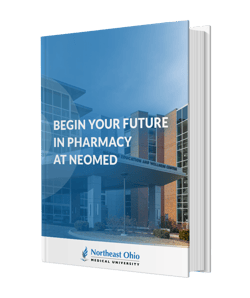
Access our eBook "Begin Your Future in Pharmacy at NEOMED" to learn more about what it takes to become a pharmacist.

About the author
Kelly tomory.
Assistant Director of Admission
More Articles
What do you learn in pharmacy school here are 6 surprising things, how hard is it to get into pharmacy school 3 key application tips, 4 tips for your pharmacy school interview.
Writing the Personal Statement for Pharmacy School: A 5 Step Checklist
You’ve likely written a personal statement at some point in your life. Perhaps while applying to your undergraduate program, some of your schools required you to include an essay describing your achievements, yourself, and what you hope to accomplish in your time at their university. Similarly, many pharmacy programs will require you to write a personal statement for their application.
This, however, is different. You will be able to highlight your relevant accomplishments and address why you want to become a pharmacist to stand out truly . With so many applicants during each cycle, admissions officers use this personal statement to gauge whom they wish to speak with for an in-person interview.
At this phase of the application journey, you've narrowed down the pharmacy schools you’re applying to. Your transcripts are in, letters of recommendation are ready, and it’s time for your pharmacy personal statement. The good news is that, unlike undergraduate applications that sometimes have different prompts, you must answer for various schools; your one pharmacy school personal statement will be sent to every program through your PharmCAS application . That also leaves an exciting challenge: Even if you have a favorite, you must consider how you want to write this personal statement, as it shouldn’t be tailored toward one specific school.
1) Determining the Narrative
When writing a pharmacy school personal statement, the most common pitfall students experience is the need for more effort placed into their writing. While your grades may be exceptional, and your letters of recommendation prove that your student-teacher relationships are healthy and you are a pleasure to have in class, having a generic pharmacy personal statement doesn’t differentiate you from other qualified applicants. If all applicants have already covered the first two things, the personal statement may be the shining piece of the application. For most students, writing this statement will be the most challenging part of the application process.
Begin to formulate your narrative. Lay out the structure and the different sections. There’s no specific format that pharmacy schools are looking for, so make this personal statement unique to yourself. As mentioned, the “cookie cutter” approach to this part of the application is where most students stumble. Use your time wisely and start early . Additionally, you can easily find a sample personal statement on various websites to help structure your thoughts. However, remember that these should be used only as samples and that you shouldn’t rely on them to format your statement.
2)Crafting a Unique Story
Each pharmacy school program wants students who demonstrate tenacity, which will help them succeed in their respective programs. One way to approach writing your pharmacy school personal statement is from the point of view of the admissions committee. Anyone charged with reading thousands of applications will focus on specific questions that signal a level of quality about the rest of the personal statement.
First, what's the reason that this student is choosing pharmacy as their career? Are they doing this for income or a genuine interest in providing the best care for patients? Does the applicant demonstrate a thoughtful understanding of their strengths and weaknesses? Do their ideals align with the mission statement of the school of pharmacy? Each reviewer may concentrate on different questions, but they want to see you feel a personal drive for a career as a pharmacist . Place yourself into the seat of an application reviewer and formulate different questions you could ask students. Try answering these questions and see how genuine your answers are. How you answer may decide if you want to continue to pursue this pharmacy school path.
3) Focus on Your Opening
One universal method many writing courses teach you is always to have a solid opening statement. I'd like you to please use this as an opportunity, to begin with a personal story about why you decided that pharmacy is the right career for you or maybe an inspiring quote that has always resonated with you. The reviewer may have reviewed several applications, so your first few sentences should stand out. You want to be able to make an impression from the beginning while showing an earnest drive to spend a career as a pharmacist.
Once you’ve effectively engaged the reviewer, it’s time for the “meat” of the personal statement. What do pharmacy application committees genuinely want to hear?
4) Getting to Know You
They want to learn more about you before meeting in a live interview. Tell your own story succinctly but without cutting corners. Briefly describe how you learned to overcome obstacles like that to better yourself and those around you. Sure, you can write about your most relevant academic accomplishments. But go beyond that.
Discuss how certain clubs and organizations have helped you progress through your undergraduate experience and how those organizations may have led you to pursue the path of pharmacy school. Highlight the leadership positions you may have held in college that have helped mold you into the leader you see yourself as today. After setting those up, discuss the skills you’ve acquired to help you in pharmacy school and how they’d make you a better pharmacist.
When you mention your relevant academic studies, please keep repeating the pharmacy college admission test (PCAT) scores or the 4.0 GPA you achieved. The committee has this information before them as they read; they don’t need to be reminded.
Talk in detail about your relevant work experiences, such as research or a part-time job in a pharmacy. Discuss how these different work experiences furthered your commitment to the profession. Identify what aspects of the pharmacy setting may have attracted you and what you have learned from these experiences. Some students come into this part of the application process without work experience. That’s okay. You can highlight any volunteer work related to healthcare or pharmacy.
5) Close with Confidence
Finally—and we can’t stress this enough—keep your writing professional. You’re making an impression on a professional committee, and as much as you want to make your statement sound lighthearted, remember that the reviewers’ time is at a premium for reviewing the essays and interviews in the next round.
Be succinct, direct, and human.
Remember to keep our advice top of mind:
The goal of your personal statement is to showcase why you would be the ideal pharmacy student and why your traits/qualities reflect those of a pharmacist.
Be as authentic as possible when detailing why you want to be part of the PharmD program.
GPA and PCAT scores can only get you so far. Your personal statement is a chance for you to stand out in front of the other applicants who apply to the same pharmacy program as you.
Remember, perfecting the personal statement takes time and your admission may depend on how much effort you ultimately put into your writing.
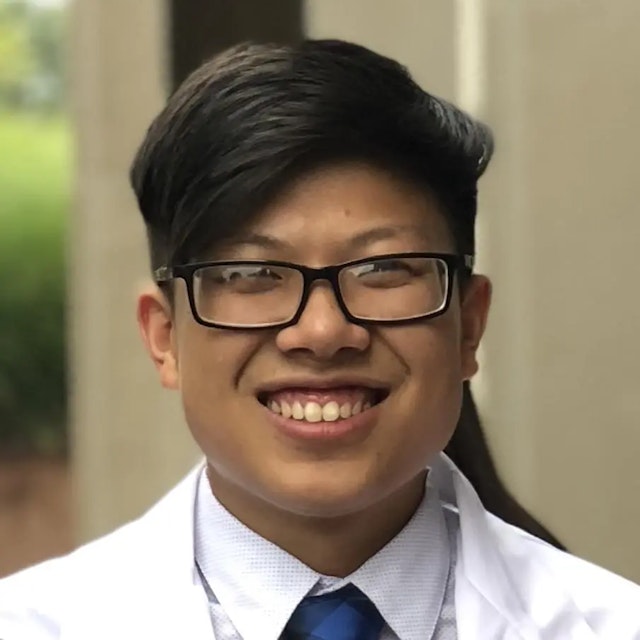
Hong Chen, PharmD
My name is Hong Kui Chen and I am a graduate of The Ohio State University Pharmacy Class of 2022. I am currently working as a clinical research associate at Medpace, Inc, a contract research organization based in Cincinnati, Ohio. My work mainly consists of traveling to various sites around the country and providing protocol training on new clinical trials or monitoring data. While I enjoyed the traditional pharmacy role of working in retail or hospital, I wanted to expand and pursue this non-traditional role to see how clinical trials operate. I have a passion for being able to impact patients in a grand scale and even though I don’t have the 1-on-1 patient interaction, the work that I do can have long lasting contributions to overall patient health.
Opinions and information published by the author here on PharmDDegree.com are of my own and do not necessarily represent the views or opinions of my employer.
Do Not Sell My Info
- How to Write a Winning Pharmacy Personal Statement with Ease
- Great Ideas for Writing a Killer Pharmacy Personal Statement
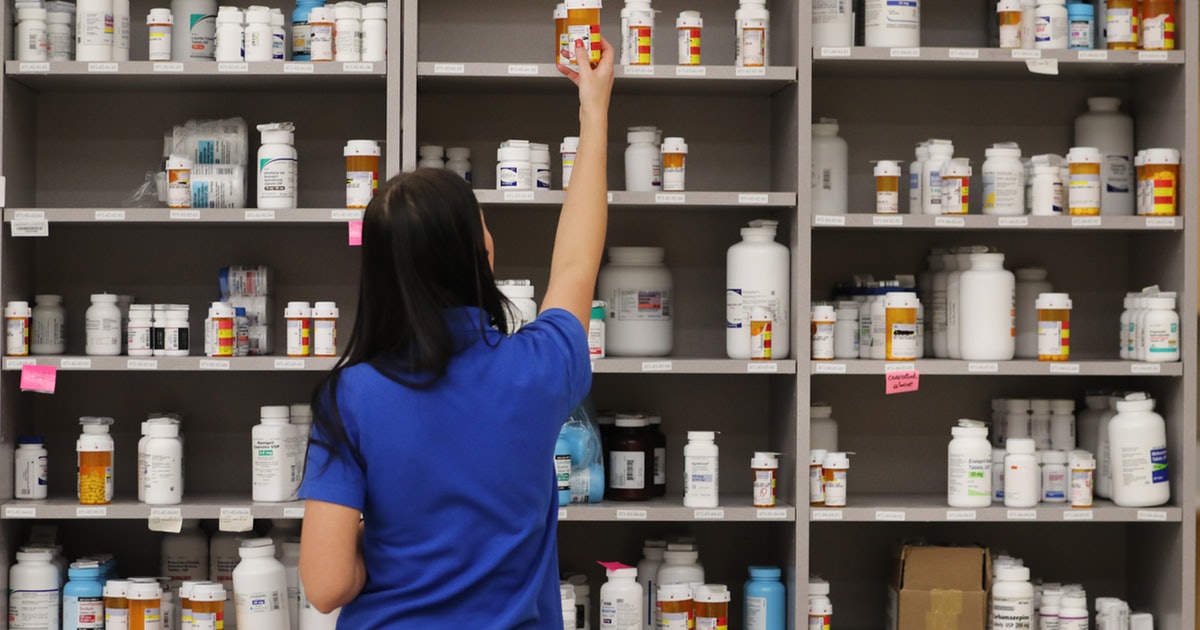
Why is it so important?
Why consider the target audience, how to write the best admission essay for a pharmacy school, the role of an introductory section, why use attention grabbers, your self-reflection, get a second opinion, how to impress your admission officer, dos and don’ts of creating the best pharmacy personal statement, what is a key secret, check compatibility, pharmacy personal statements examples, sample of pharmacy school personal statement – describing the development of student’s interests from the beginning of school, explaining my interest in pharmacy and how i am fit for this college – one of the most popular pharmacy school personal statement topics, my critical view on the current state of the pharmacy science – an alternative pharmacy school essay example., final words.
Writing essays can be difficult for some students. Creating an impressive pharmacy personal statement is a challenge. It’s hard for many people to do the following:
- Come up with an interesting subject;
- Organize important information;
- Make reasonable personal statement conclusions ;
- Grab readers’ interest;
- Reflect related skills or a life experience.
Realize the role it plays in the future career of pharmacists and take your pharmacy school personal statement very seriously. There are many people who want to pursue this career. Most of them have high test scores, good grades, personal achievements, and other strong sides, but only a few of them capture the attention of admission officers.
Use your pharmacy personal statement as a chance to succeed. It should present your personality to the committee. Make sure that it turns uninteresting information, such as awards, grades, courses, and test scores into prominent traits of your individuality. Your personal essay for a pharmacy school should highlight not only your academic accomplishments but also show you as an asset to its community. It makes your application noticeable.
Pay close attention to your target audience because you submit a personal statement to study pharmacy to admission officers who will read and evaluate it. They spend only a few minutes of each application. That’s why your paper should stand out. They analyze not only personal statements, but they also check science GPAs, research projects, letters of recommendation, transcripts, etc. Officers search for candidates with these basic traits:
- Strong analytical skills ;
- Critical thinking;
- High intellect;
- The ability to learn fast;
- Suitable personality for helping people.
Your pharmacy application should leave a lasting impression.
How to write a good personal statement to the chosen pharmacy school? The answer is simple - make sure that:
- It contains a catchy introductory paragraph;
- You use a strong opener;
- It includes a lot of self-reflection;
- You get a second opinion.
The introduction plays a decisive role because it can either grab readers’ interest or ruin your application success. Write it when the main body is ready. This paragraph serves many important functions, such as providing the audience with a short plan of what you will tell them further.
Use catchy attention grabbers in your opening lines or sentences to add more color to your paper without overdoing with intrigue. Opt for neutral starters if you share a really meaningful experience.
The best application to a pharmacy school involves a lot of self-reflection, sincerity, and honesty to make it easier for readers to relate to it. You may find it hard to share your life experiences and feelings, but it’s something you need to do to stand out. Don’t go overboard.
Ask other people (your friends or family) to read your final draft and share their opinions. Their advice can help you transform a mediocre paper into a brilliant and winning one because they encourage you to look at it from different angles. Otherwise, you may revise your essay many times in vain.
"Before I answer this I’d like to state upfront that there are three hurdles that applicants must clear to gain admission to the top colleges. So bear in mind that you can’t focus on just one quality for your candidacy at the expense of others. This said, most admissions officers to whom we have spoken agree that demonstrating fit is the one quality that most impresses them when reviewing applications. This means showing the school that you understand what makes it unique as well as what you have to offer and, consequently, why you sincerely want to attend that school. Far too many applicants view the admissions game as purely numeric. Smart applicants realize they need to put 100% of their best effort into each stretch school they target. Consequently, they understand why it is better to apply to 10 schools with each application reflecting 100% of their best effort than to get stretched too thin and apply to 20 schools with each application only reflecting 50% of their best effort. So, in conclusion, be sure to spend the time to demonstrate a strong fit with each stretch application you submit. Quality will triumph quantity every time." By admission consultant David Petersam.
If you lack enough experience in this field, look at dos and don’ts because they will guide you in the right direction. What should you do?
- Start early to set aside enough time to complete all stages;
- Keep the target audience in mind;
- Use a correct structure;
- Organize all ideas to keep readers’ interest;
- Use proper punctuation , grammar, and tone;
- Mention future goals;
- Reveal your true personality;
- Edit and proofread a final draft a few times.
What are the things that can ruin your admissions essay?
- Repeating the same ideas (they make your application to a pharmacy school boring and weak);
- Including a tangential discussion;
- Being in a hurry;
- Exceeding a word count;
- Making excuses;
- Using redundancies and fillers;
- Expressing your viewpoints on controversial topics;
- Underestimating the chosen profession;
- Making your pharmacy school statement too emotional or personal;
- Listing irrelevant achievements.
Take into account the basic criteria that define the overall success of your pharmacy school application:
- Appropriateness;
- Time management.
The key secret of writing a successful application is to convince admission officers in your interest and dedication to the chosen specialization. How can you do that? Tell them about the impulse that led to this decision. Explain your desire to pursue a pharmacy career path clearly to let the committee understand your reasoning and logic behind it.
Know why you want to prosper in this profession. Give the answers to some basic questions to determine the following:
- What attracts you in this field?
- Why did you choose pharmacy?
- What does a pharmacist do?
- What inspires you to study hard?
- The life event that spurred you to choose this career.
- How you differ from other applicants?
Helping people was my passion beginning from studying in elementary school. At first, it was mostly assisting my parents and neighbors but later I began reading the special literature and even developed a specific interest in chemistry and microbiology books (as well as related free online content on related Web resources). This was a powerful motivation for me to achieve higher grades during my studies because of understanding of the necessity to enter a higher education institution afterward. After graduating from high school I had to choose between medical sciences and pharmacy services fields and finally decided to stay with the latter.
Applying to this college means a lot to me. I believe that after studying here I can obtain the most valuable knowledge and support to pursue my career in the area of my interest and also to bring some real value and positive results to the society which generally summarizes my ISAT personal statement on this decisive day. Pharmacy terminology is like a special language which I have started to learn and hope to master completely quite soon.
Looking for dental school personal statement or personal statement for residency ? Browse our library, you will find everything there with ease.
Chemistry and biology were my favorite subjects during the whole process of studying, particularly because some of my relatives have been working in these spheres. There were a lot of specialized books (not only in the English language) on related subjects at my home so as a passionate reader I have explored all of them early enough, during my free time. Eventually, it led me to building solid plans of continuing my learning in a pharmacy college, improve my medical skills and obtain great experience.
After graduating from my high school with a diploma with honors, I feel prepared to enter this college and to successfully obtain a degree which will allow me to proceed to higher levels of scientific research and reach the maximum of content because of this knowledge. My skills include all basic kinds of chemistry operations, basic knowledge about microbiology, familiarity with most widespread kinds of germs and medicine (antibiotics and others), first aid services, vitamins and their influence on children and adults, volunteering, etc. In this letter of intent, I would like to express my hopes and dreams which might come true as a result of this application day.
Unlike many people I know, I’ve never regarded science as something far away from daily life, especially pharmacy and chemistry which are so much involved into everyone’s existence. Observing tangible effects of work, bringing support to the society and helping out people that are close to me – these are the main factors motivating me to proceed with professional studying in the U.S. or international pharmacy field. This is the first of my personal statements for this college and I am happy for this opportunity to be free to speak up.
Apart of basic chemistry and biology knowledge received in the process of my general learning and additional online training, I have read a lot of specific research works and eventually became familiarized very well with the history of pharmacology theory and practice in the U.S and Canada beginning from the late 19th century up to the modern day, particularly with problems and challenges which have been noticed lately in this sphere ( antibiotics overuse is one of the brightest examples). My dream is to play a notable part in dealing with those challenges and making certain contribution to the development of better results of medicine services for everyone!
Your admission essay is a great chance to show who you really are and focus on your positive traits. What if you can’t write it yourself? Get expert help not to compromise your academic future. Hire professional personal statement writers to do this job and let them help you succeed and submit an impressive application and cool personal statements that support you with ease.
If you are applying for a nursing degree at university, then you should attach a personal statement to your application and take care of its stellar content. Being one of the most important selling points in your bachelor degree application, your nursing personal statement should demonstrate that yo...
Some students think that the residency personal statement (RPS) is the same as the graduate essay, but it’s not quite right. Personal statement residency is one of the great ways to share your character and abilities and plans for your career as a physician. One of its goals is for applicants to add...
If you want to become a law school student, you don’t have any chance to explain to the committee why you’re a perfect fit, except for your application. Look for legal examples to get the academic consulting necessary to submit a successful law school personal statement and succeed at the interview....
Pharmacy School Personal Statement Tips

Many programs require a personal statement as part of the pharmacy school application. This is essentially an essay that addresses why you want to be a pharmacist, and how your personal background and achievements support this goal. This writing sample provides the only opportunity to express yourself in writing to differentiate your application from your competitors. A significant effort should be made to have the best possible personal statement that addresses the interests of the admissions committee.
- How to write a pharmacy school personal statement

PharmCAS provides general guidance on how to craft a personal statement. Each year, they provide a prompt that directs the topic of the statement. They recommend that applicants do not tailor their writing to one program, because you will only be permitted to submit one personal statement per application cycle. PharmCAS will send this statement to all programs to which you are applying that year.
For many applicants, the personal statement will be the most difficult part of the application preparation. Applicants know this is important, so they may overthink it or suffer from writer’s block. A useful exercise before you begin writing is to think about the answers to the following questions:
- Why do you want to be a pharmacist? You should demonstrate a genuine interest in the profession and helping people.
- What experiences have prepared you to be successful in this career?
- What qualities do you most admire in pharmacists? Can you demonstrate that you have these same qualities through your academic achievements or work experience?
- What makes you stand out as a unique candidate? Do you have real-life experience? Have you volunteered in health care settings?
- Is there any deficiency in your application that you want to proactively explain? This may be your only opportunity to explain any low grades, gaps in education, or suboptimal PCAT scores. However, do not make excuses; own your mistakes and show how you have learned from them.
The personal statement should address the topics that you think are the most important to paint a picture of you as a successful pharmacy student.
The personal statement should address the topics that you think are the most important to paint a picture of you as a successful pharmacy student. Mission statements of the schools to which you are applying can help direct your writing, but you should keep the statement general enough that it can resonate with the admissions committees of any program.
Ultimately, the personal statement is a story that will show the admissions committee that you are a unique person who is worth more than their GPA and PCAT scores. The statement should be an authentic representation of your story and give the reader a glimpse into what you would be like as a pharmacy student and professional. The text should show, not tell, the reader what you bring to the table. A strong opening is important: Grab their attention with a relatable anecdote or quote.

One approach to writing the statement is to brainstorm all the questions above, taking notes as you think of the answers. Then, sketch an outline of the statement that will help get the juices flowing. Try to write the first rough draft in one setting, not worrying about the exact words. You can go back later to refine wording, add details, and revise. Lastly, you should proofread the statement multiple times. Essays riddled with grammatical errors and typos send a message to the reader that you do not pay attention to detail , which is an important skill for pharmacists. Consider having another person who is unbiased proofread it. Numerous companies offer professional essay proofreading and editing services, such as Scribd .
- What does a school look for in a personal statement?
Each program is looking for well-rounded students who are likely to succeed at their institution. They do not expect all students to be the same.
Each program is looking for well-rounded students who are likely to succeed at their institution. They do not expect all students to be the same. Diversity is desirable, so don’t pretend to be something you are not because you think it is what they want to hear. Admissions committees can see right through disingenuous statements. Content that schools may be looking for include the following:
- Is this person applying to pharmacy school for the right reasons? You won’t be happy or motivated in a job that you are doing only for money, job security, or to meet someone else’s expectations.
- Do they understand the job and its demands? Speak to any relevant experience you have working, volunteering, or shadowing pharmacists.
- Has the applicant demonstrated personal growth in the years leading up to their application? If your grades improved in the last year, you can explain that it shows your commitment to education and renewed work ethic. If you took on new extracurricular responsibilities or work assignments, highlight any leadership skills you’ve developed.
- Is the essay organized and clearly written? Communication skills are important for pharmacists, because they communicate with customers, physicians, and insurers daily.
- Has the applicant explained any weak points in their application? Admissions committees realize that life can be messy. Be honest if personal circumstances affected your grades or PCAT scores. Make it clear that you’ve moved past these circumstances and they won’t impact your ability to be a successful pharmacy student. However, don’t make excuses for shortcomings that don’t have a good explanation.
- Do they demonstrate a “fit” for the values of the program? Use anecdotes to demonstrate that you live their values and mission.
Learn More about Pharmacy School Requirements by State
- AR Arkansas
- CA California
- CO Colorado
- CT Connecticut
- DE Delaware
- IL Illinois
- KY Kentucky
- LA Louisiana
- MD Maryland
- MA Massachusetts
- MI Michigan
- MN Minnesota
- MS Mississippi
- MO Missouri
- NE Nebraska
- NH New Hampshire
- NJ New Jersey
- NM New Mexico
- NY New York
- NC North Carolina
- ND North Dakota
- OK Oklahoma
- PA Pennsylvania
- RI Rhode Island
- SC South Carolina
- SD South Dakota
- TN Tennessee
- VA Virginia
- WA Washington
- DC Washington, DC
- WV West Virginia
- WI Wisconsin

- What should you avoid in a pharmacy school personal statement?
Admissions committees have numerous applications to review. You want to make sure every sentence in your personal statement adds value and has no chance of leaving a negative impression. Here are examples of things to avoid:
- Don’t repeat your transcript and PCAT scores. They already have these in their file. Essay word counts are limited, so make the most of every word of your essay to provide new information.
- Don’t write off topic. Tell your story directly and concisely. Going off on a tangent or adding words just to make it appear longer will distract from the message you are trying to convey.
- Don’t include irrelevant academic achievements. No matter how proud you are that you won the geography bee in fifth grade, it isn’t relevant to your aptitude for success in a pharmacy career.
- Do not plagiarize. This is a major sin in academia. It will get your application tossed to the “no” pile without a second thought.
- Avoid clichés. Cue eye roll from the admissions committee who is forced to read hundreds of statements, many with poor attempts to use clichés or humor.
- Do not talk about controversial topics. The essay should be professional. Topics like religion, personal emotions, money, and politics have no place in the workplace.
- Don’t have grammatical errors or spelling mistakes. Hire a professional editor to proofread your writing, or use a do-it-yourself tool, such as Grammarly .
Pharmacy school personal statement examples
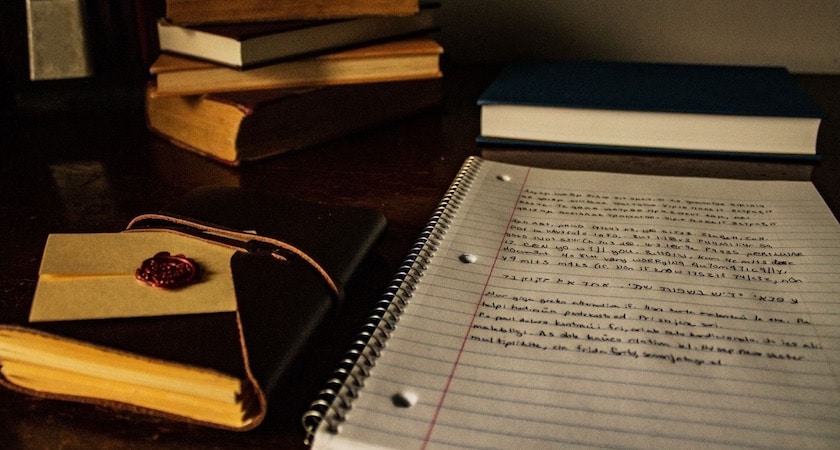
Personal statements are one of the most important components of your application. They are your only opportunity to show the admissions committee that you are more than your GPA and PCAT score. This is your chance to stand out from the crowd. The quality of your essay will be determined by how much work you put into the writing. Several examples of essays from students who were accepted to pharmacy programs can be found on the internet at sites like Studential and Applytouni . Reading these can give you an idea what a good statement looks like before you begin writing your own.
- Additional Resources:
- Pharmacy School Directory
- Pharmacy School Letter of Recommendation Tips
Request Info
Complete this form to request information directly from PharmD program option, tuition, financial aid and more.
Highest Level of Education High School Some College Associates Bachelors Masters or Higher
Phone Number
"By pressing "Request Info" I hereby consent and agree to receive autodialed calls and texts or pre-recorded messages by or on behalf of and PharmacySchoolFinder at the phone number(s) provided above. I understand that the foregoing consent is not a condition of program application or enrollment and agree that the terms of the privacy policy apply."
All fields required
Newsletter Signup
Login your account.
Enter your e-mail address and your password.
- Remember Me Forgot Password?
Register Your Account
Create your account. It will take less then a minute
- I agree to the Terms of Service & Privacy Policy
- Skip to Content
- Skip to Main Navigation
Applying to pharmacy school
Applying to pharmacy school can be complicated, but we are here to assist! Advisors at Health Professions & Prelaw Advising can help you develop your best strategy and troubleshoot problems you encounter in your application. Make sure to attend one of our Personal Statement Writing Workshops so you can get started early on your application essay.
The PharmCAS application #
Applicants apply to pharmacy schools through an electronic, centralized application administered by the American Association of Colleges of Pharmacy called PharmCAS . Once you complete your PharmCAS application, it will be processed and sent to all the pharmacy schools you select to receive it. Nearly all schools and colleges of pharmacy in the United States participate in PharmCAS.
For the PharmCAS application, you will create your own User Name and Password that will allow you to create your electronic application. You can log in, fill out part of the application, and save your changes before logging out. Once you are satisfied that everything is accurate and complete, you submit it electronically and it is sent to PharmCAS for processing. the PharmCAS has four sections to it.
In this section, you provide background information about you that ranges from contact, demographic, and social-economic status information to infractions of the law or school conduct policy.
On the PharmCAS application, you will fill out information regarding every college course you have taken, so you will need to refer to transcripts from every college or university you have attended, whether during high school, summers or after you received your bachelor’s degree. You will also need to order official transcripts from all of the colleges and universities you have attended to be sent to the application service. At IU Bloomington, you can order your transcript from Student Central . PharmCAS will not process your application without all of your transcripts. You can check the status of your online application to see if your transcripts have been received. PharmCAS will verify that you have entered your coursework correctly on the application by matching your application against the transcripts from the colleges and universities you have attended. After PharmCAS processes your application, they will send it to the schools you have selected to receive it.
The PharmCAS application includes a section where you can provide information on experiences such as pharmacy-related experience, health care experience, employment, and extracurricular activities. Shadowing a pharmacist would be included here. Achievements include scholarships, awards, and publications. Next, you will enter any licenses or certifications.
You will type or cut and paste the personal statement into this section. It can be up to 4,500 characters including spaces (approximately one single-spaced page). The admissions committee will read your essay to learn why you want to become a pharmacist. An effective approach is to write about the series of events in your life that have led you to pharmacy. What started you on the path toward the goal of becoming a pharmacist, and what kept you on that path once you started, even at times when it wasn’t easy? Drawing material from your prehealth journal can provide useful insights and help bring your writing to life.
Make sure to attend one of the Personal Statement Writing Workshops offered by Health Professions & Prelaw Advising to help you begin a draft of your essay. Schedule an appointment with a HPPLA advisor for feedback on a draft of your essay.
Letters of recommendation #
Pharmacy schools require that you submit letters of recommendation written by others on your behalf along with your application. Letters of recommendation can provide admissions committees insight into your personal qualities. Recommendation letters can tell them about your communication and interpersonal skills, and your readiness for pharmacy school. Developing relationships with your professors is an important part of your intellectual growth and will help you obtain strong letters of recommendation.
Pharmacy schools vary in their requirements for letters of recommendation and PharmCAS will allow you to submit four letters as part of your application. Most pharmacy schools will require a minimum of three letters of recommendation. The Purdue University College of Pharmacy requires two letters of recommendation. Consult the individual pharmacy school websites for information on the recommendations each school requires, or review the PharmCAS website's page on supplemental requirements .
Letters of recommendation are sent to pharmacy schools directly from the recommenders through the PharmCAS application system. For more information, please refer to the application instructions on the PharmCAS website.
Program Materials
In addition to the above items that are required for submitting your PharmCAS application, some pharmacy schools will require additional materials. These materials could include additional essays, a resume, or a form listing prerequisites.
Interviews #
Before admitting you, pharmacy schools want to meet you in person. The interview helps schools evaluate personal qualities they can’t observe directly in your written application. Selected applicants are invited for an interview. You should prepare carefully for this crucial component of the admissions process.
Pharmacy schools use interviews to gain insight into how you would interact with patients. Schools also use the interview to assess factors such as motivation and ability to cope with conflict. They want to know how likely it is you would take a spot if they offered one, so it is important that you express your enthusiasm and sincere interest in the school!
In a job interview, the most important question for your interviewer is probably, “What can this person do for our organization?” For your interviewer at an pharmacy school the most important question may be, “Would I trust this person as a pharmacist?” One of your most important goals is to demonstrate you have the ability to connect with others on a personal level.
To prepare, review your personal essay and activities listed on your application. It’s helpful to practice responding to interview questions (obtain a list of questions in the HPPLA office). You may be asked situational ethics questions that require you to think through how you would respond when faced with difficult decisions as a healthcare provider. Study the school’s curriculum via its website and prepare to ask questions about the school’s program in the interview.
Make sure to attend one of the HPPLA-sponsored Interview Skills Workshops in the fall semester and schedule an appointment with a HPPLA advisor for a mock interview.
On this page...
- The PharmCAS application
- Letters of recommendation
- Advertise With Us

- Pharmaceutical Technology
- Clinical Pharmacy
- Pharmaceutical Microbiology
- Pharmacology
- Pharmaceutics
- Pharmacy Management
- Pharma Companies
- Pharmaceutical Machines
- Questions and Answers
- PHARMA MARKETPLACE
- Pharma Marketplace
Tips for Writing a Pharmacy School Personal Statement
Like in any other field of education, a pharmacy statement is a way of selling yourself to the admission tutors by showing them why you are a great pharmacy candidate. A personal statement is an opportunity to detail your skills, strengths, and career objectives in pharmacy. A personal pharmacy statement allows you a maximum of 4000 characters. It would be best to discuss why you are interested in pursuing a pharmacy degree in as few words as possible while ensuring you stand out from the crowd of prospective students.
- 1 Why is a personal statement important?
- 2 What makes a good personal statement?
- 3 Common mistakes to avoid
- 4 What to include in your statement
- 5.1 1. Preparation
- 5.2 2. Proper grammar
- 5.3 3. Proper structure
- 5.4 4. Connect with your reader
- 5.5 5. Include only Pharmacy relevant achievements
- 5.6 6. Avoid plagiarism
- 5.7 7. Avoid controversial topics
- 5.8 8. Proofread your work
Why is a personal statement important?
Statistics show that at least 50% of pharmacy school applications get rejected. These applications are not always denied because of poor scores. These students typically have scored just as good as their accepted counterparts. A personal statement is essential because it is what makes or breaks your application. This is because admission tutors are keen to welcome candidates who are genuinely passionate about and dedicated to the profession.
What makes a good personal statement?
An excellent personal statement uses evidence. Support all your claims. It would be best if you remembered that the admission tutors already know you are trying to convince them that you are a suitable match, as are all the contenders. Sure, you can go on and on about how willing you are to learn, but it would be more effective if you backed such claims with real-life examples.
Please use a personal statement writer service to get professional custom help in writing a good pharmacy personal statement. As a matter of fact, CustomWritings is considered to be one of the most reliable services on the market currently.
Common mistakes to avoid
It is important to remember that the perfect pharmacy personal statement does not have to follow a specific format. Remember that the admission tutors will only review your pharmacy statement for 10-30 minutes, no matter how much time you spend on it. This is not to say that you should rush through it but focus on capturing and maintaining the tutors’ interests. The tutors will review your statement from different angles, meaning you cannot afford to leave room for misinterpretation.
Please resist the urge to follow a predetermined formula you acquired online or from your friends, regardless of how they scored on it. You may easily be tempted to borrow ideas from successful pharmacy students, but this will compromise your authenticity. The admissions tutors have likely seen numerous personal statements so do not embarrass yourself by submitting a copied statement. Besides, you want to show how passionate you are about pharmacy, don’t you?
Read Also: How to Become a Chemistry Problem Solver
What to include in your statement
- Pick a specific pharmacy area you are most interested in and explain why you are interested in that area. Show that you are passionate about that subject (it helps if you are passionate about the area you choose to write about).
- Highlight your motivations for studying pharmacy. When did you realize you wanted to pursue pharmacy? Why? Are you able to support this with evidence from your life?
- Describe your hobbies and extracurricular activities (especially if they are related to pharmacy). The goal is to highlight the skills you have gained from these activities and how they will benefit you in your studies as a pharmacist.
- Include any work experience placements in related fields such as nursing or medicine. Talk about what you learned from these experiences.
- Talk about your traits and qualities that you feel make you a good pharmacy student.
- Please demonstrate that you are a good reader by talking about recent related reads and how they have shaped your thinking. Feel free to respectfully share any views and opinions, always remembering to support them with solid evidence.
How to Write a Good Pharmacy School Personal Statement
Below are a few tips to make sure your statement makes your application stand out and increase your chances of getting accepted into your program of choice:
1. Preparation
Preparation is key. Start early so that you do not end up rushing and producing a mediocre statement. Start planning early as you don’t want to be pressed for time.
2. Proper grammar
Use proper grammar and punctuation. Poor grammar makes for a wrong first impression. Polish your basics on grammar and avoid submitting a statement riddled with error.
3. Proper structure
Structure your statement correctly. Ensure the first statement captures your reader’s attention and then has a few supporting paragraphs. You have a tiny window of grabbing your reader’s attention, so use it wisely. Finally, have a conclusion that ties it all together.
4. Connect with your reader
Connect with your reader, even if it means sharing a few personal stories. The goal here is to make sure you communicate who you are. A personal statement is a monologue to the admission committee, and if they can connect with you, they will like you.
Show the admission tutors that you are aware of the challenges that await you and that you are committed regardless. Talk about how rewarding you think this path will be for you, your family, your community, your patients, and the pharmacy practice itself.
5. Include only Pharmacy relevant achievements
If you have lofty achievements outside the pharmaceutical field, do not include them in your statement. Include only pharmacy-related experiences.
6. Avoid plagiarism
Committee members can always see through plagiarized works, so avoid this at all costs. This will only destroy your credibility in the field.
7. Avoid controversial topics
The personal statement is not a discussion ground for questionable topics. Do not alleviate issues that disagree with the overall subject in question.
8. Proofread your work
Sometimes people miss tiny mistakes by not proofreading their work. Have friends and family check your work and act on the comments. Inadequate proofreading can be catastrophic, so ensure you correctly use your language before sending the statement to the admission committee.
As now you are well acquainted with the components of writing an impeccable pharmacy personal statement , you should have no trouble in getting admitted into Pharmacy school. Pharmacy school is about honor and prestige, and you need the best of luck in this noble endeavor.
Chemistry Problem Solver: How to Become One?
Understanding the Various Types of Hepatitis Virus

July 18, 2024
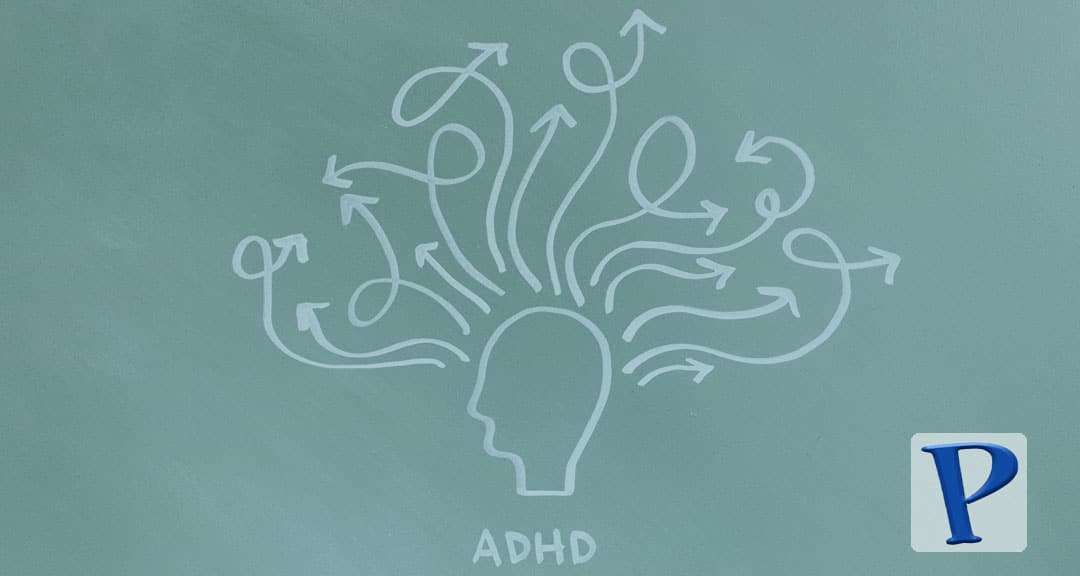
May 20, 2024
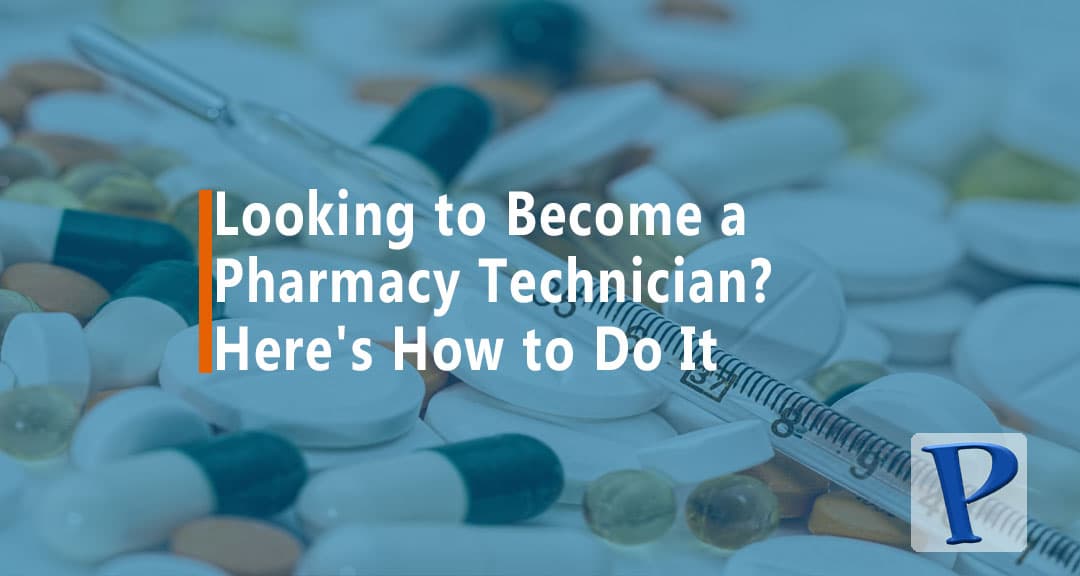
November 10, 2023
Thanks for Sharing the Great Post.
You are welcome. I am happy you found it useful.
I’m very excited to have found out this article, Keep on writing more and more. All Assignments Help
I love dis article
Leave a Reply Cancel reply
Your email address will not be published. Required fields are marked *
- Drug Product faking: Methods for Testing Counterfeit Drugs
- 15 Astonishing Statistics and Facts about U.S. Pharmaceutical Industry
- Hard Gelatin Capsules: Formulation and Manufacturing Considerations
- First Pass Effect Explained
- Preformulation Studies: Solubility analysis
- Application of Ultrasound to the Pharmaceutical Industry
- 6 Striking Things Every Cancer Patient Had In Common
- COVID-19, Influenza and Sanofi’s Innovative Flu Vaccine
- Which excipient is used in formulation of tablet?
Regulations, Guidelines and Clinical Trials
Important links, submit articles.
- Terms and Conditions
- Privacy Policy
- AI Content Shield
- AI KW Research
- AI Assistant
- SEO Optimizer
- AI KW Clustering
- Customer reviews
- The NLO Revolution
- Press Center
- Help Center
- Content Resources
- Facebook Group
A Quick Guide to Writing Pharmacy School Personal Statement
Table of Contents
When it comes to applying to pharmacy school, your personal statement is one of the most important pieces of your application. It’s your opportunity to stand out from the rest of the applicant pool. So how do you write a personal statement that will make an impression? This article provides valuable tips and a pharmacy school personal statement sample to study and use as inspiration while writing one for yourself.
So read on for everything you need to know about writing a successful pharmacy school personal statement!
What Is a Pharmacy School Personal Statement?
Pharmacy school personal statements are documents that allow pharmacy students to introduce themselves and their reasons for wanting to attend pharmacy school. They can also highlight any unique experiences or qualifications the student has that would make them a good candidate for admission into pharmacy school.
Personal statements are important because they help admission committees get to know potential students beyond just their grades and test scores. Your statement should be well-written, honest, and reflective of who you are as a person.
What Do Colleges Look for in Pharmacy Students?
The skills and qualities that colleges look for in pharmacy students typically include the following:
Strong Analytical and Problem-Solving Skills
Pharmacy is a science-based profession, so the ability to think critically and solve complex problems is essential.
Solid Math Skills
A foundational knowledge of math is necessary for understanding the concepts behind pharmaceutical calculations.
Excellent Communication Skills
The pharmacist’s role involves communicating with patients, other healthcare professionals, and pharmacists at different pharmacies. Good communication abilities are essential for success in this field.
Passion for Helping Others Improve Their Health
Pharmacists play a significant part in improving patient care. So it’s important that potential students have a sincere desire to help others achieve better health outcomes.
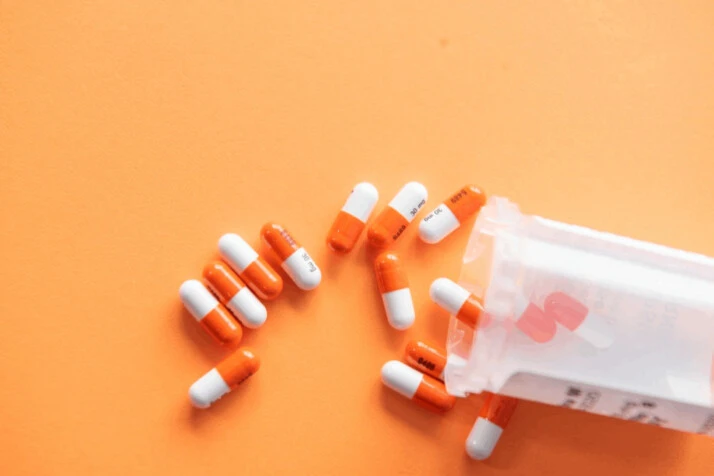
Tips to Write a Pharmacy School Personal Statement
Here are some practical tips to keep in mind when writing your pharmacy school personal statement :
- Start early: Give yourself plenty of time to write a strong personal statement. This isn’t something that can be rushed, so start thinking about it well before the application deadline.
- Be specific: Don’t just say that you want to become a pharmacist because you like helping people. Give concrete examples of how you’ve helped others in the past and what motivated you to pursue this career path.
- Sell yourself: Emphasize your strengths and why you believe pharmacy is the right fit for you. Think about what sets you apart from other candidates.
- Show, don’t tell: Rather than simply stating your goals or qualifications, use anecdotes or stories to illustrate them. This will make your essay more engaging and unique.
Pharmacy School Personal Statement Sample
Use the following pharmacy school personal statement sample as inspiration to craft your own:
Ever since I was a little girl, I loved going to the pharmacy with my mom. Watching her talk to the pharmacist always fascinated me and sparked my interest in pursuing a career in pharmacy. As I grew older, I began to realize that pharmacies are more than just places where you can buy medication. They play a crucial role in our healthcare system by ensuring that medications are dispensed correctly and safely. This is why I am so passionate about becoming a pharmacist myself. I want to help contribute to making sure that people have access to quality medications when they need them most.
While attending college, I had the opportunity to work as an intern at several different pharmacies. This gave me invaluable experience working directly with patients and pharmacists alike. Through these experiences, I developed a strong love for chemistry and pharmacology. This has only solidified my desire to pursue a degree in Pharmacy once I complete my undergraduate studies.
Ultimately, my goal is to become licensed as PharmD and work within a community or hospital setting. I want to dispense medication prescribed by physicians optimally and safely to facilitate patients’ healing process. Providing high-quality care combined with warmth, compassion, and individualized service excellence will make a difference in the lives of those we encounter every day.
The purpose of a personal statement is to give the admissions committee a preview of what you have to offer as a prospective student . It allows a recruiter to form a personal opinion of you.
This article provides valuable tips with a strong sample to help you craft a pharmacy personal statement and present yourself as a qualified applicant.

Abir Ghenaiet
Abir is a data analyst and researcher. Among her interests are artificial intelligence, machine learning, and natural language processing. As a humanitarian and educator, she actively supports women in tech and promotes diversity.
Explore All Write Personal Statement Articles
How to draft meaningful length of law school personal statement.
Are you confused on how to write a law school personal statement? One of the essential elements of your application…
- Write Personal Statement
Effective History and International Relations Personal Statement to Try
Are you considering studying history and international relations? Or you may be curious about what a degree in this field…
Guide to Quality Global Management Personal Statement
Are you applying for a global management program and want to stand out from the crowd? A well-written personal statement…
How to Draft Better Examples of Personal Statements for Residency
Achieving a residency can be a massive accomplishment for any aspiring medical professional. To secure your spot in one of…
Tips for Drafting a Free Example of Personal History Statement
A personal history statement can be crucial to many applications, from university admissions to job search processes. This blog will…
Writing Compelling Dietetic Internship Personal Statement
Applying for a dietetic internship is a rigorous process and requires submitting a personal statement, which is an essential part…
Writing a Personal Statement for Pharmacy School (10 Tips)
The medicine business will never run out of demand and thus, being a pharmacist is undoubtedly a promising career. If you choose to be a pharmacist and want to get into a good pharmacy school, you need to write a personal statement. It is usually a part of the college’s admission requirements. Not sure how to write a personal statement for pharmacy school? Hey, I’m here to help.
Why is a personal statement important?
10 tips on writing a good personal statement for pharmacy school:, 1. start early.
An amazing pharmacy school personal statement needs a bit of preparation . You do not want to rush it and create a mediocre one, do you? Once you’ve decided which schools you want to apply to, take the time and start planning early about what to write . I’d say it takes at least a month of serious thoughts and several drafts before you can pen down a good one!
2. Introduce Yourself Properly
Start the personal statement with a catchy line to grab the reader’s attention . Once you’ve hooked them to read further, switch to describing yourself next. You must connect with the reader, even if it requires sharing a few personal anecdotes. The aim is to communicate who you are as a person. Think of it as a written monologue you submit to the admission committee. The more the readers connect with you on a personal level, the better the chances they’ll like you and eventually accept you.
3. Have a Proper Structure and Organize Your Essay Well
4. show your enthusiasm and commitment.
Unless you’re passionate about pursuing a career that involves legally preparing and dispensing drugs, you should not apply for admission to a pharmacy school. Your lack of interest would reflect in your essay if you are just applying for the sake of getting into college. Trust me, pharmacy school and the subsequent post-graduate courses you’d attend are no joke! You do not want to be unhappy in the future for choosing this profession halfheartedly. So, once you’re committed to writing your statement, show your enthusiasm through your words. Don’t overdo it, though. There’s a long road of struggle ahead and the admission committee must understand that you’re committed to winning the battle!
5. Do Not Add Fillers
6. include academic successes that are pharmacy-related.
Talking about achievements unrelated to the course will not help you earn brownie points. Why would winning an art contest or achieving top grades in mythology interest the admission committee? On the flip side, are there any distinctive academic successes that connect your aptitude for science or your passion for enrolling in a pharmacy school ? Be sure to include that. Try to show how you are suited for this profession. However, do not force-fit anything by talking about unrelated achievements.
If you excel in science subjects in high school, particularly those that involve laboratory experiments, include this in your statement.
7. Ensure the Grammar and Punctuation are error-free
8. say no to plagiarism.
Plagiarism or copying others’ work is your expressway toward rejection. Not only does it affect your credibility in the field, but plagiarism is also a punishable offense . There are multiple apps and tools to detect plagiarized content, so do not even think of it. Yes, you can research and look through similar examples for ideas on the content and structure. However, always write your pharmacy school personal statement in an original format and your own words. If you must copy an idea from some published sources, make sure that you paraphrase the sentences and paragraphs well.
9. Get a Second Opinion
10. display confidence, final thoughts.
A pharmacist’s job requires hard work, dedication, and utmost passion. If this is your calling, jump at the opportunity of applying to top pharma schools. Keep these tips in mind while writing your pharmacy school personal statement. Did I miss anything above that may have worked for you? Next up, you may want to explore a guide to the best marketable skills you can learn today .
Rafal Reyzer
Hey there, welcome to my blog! I'm a full-time entrepreneur building two companies, a digital marketer, and a content creator with 10+ years of experience. I started RafalReyzer.com to provide you with great tools and strategies you can use to become a proficient digital marketer and achieve freedom through online creativity. My site is a one-stop shop for digital marketers, and content enthusiasts who want to be independent, earn more money, and create beautiful things. Explore my journey here , and don't miss out on my AI Marketing Mastery online course.
- Pharmacy School
Pharmacy School Personal Statement Introduction
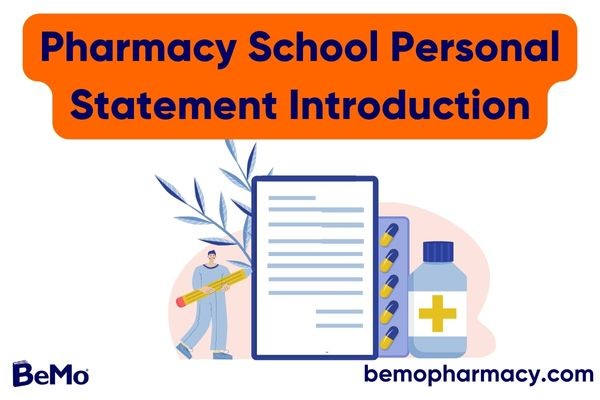
When you are writing your pharmacy school personal statement introduction, you can run afoul of any number of obstacles. From writer’s block to ineffective writing, this could be one of the more treacherous aspects to pharmacy school planning . With so much to accomplish in so little space, you will have a lot to take care of in your introduction. You might know already that your personal statement should answer why you, specifically should be admitted, and answer “ why do you want to be a pharmacist ,” but focusing on the introduction presents its own challenges.
Fortunately for you, we’ve got you covered with this article all about how to write your pharmacy school personal statement introduction, from the hook sentence through to the smooth transition into the body of your text.
>> Want us to help you get accepted? Schedule a free initial consultation here <<
Article Contents 10 min read
How to write a pharmacy personal statement introduction.
To start with, you’ll have to verify whether there are any special requirements for your particular personal statement. Pharmacy schools in the US might have different specific requirements from pharmacy schools in Canada , for example, and if you are applying to one or the other, you might want to tailor your paper to suit. While it is unlikely that there will be such huge differences that you will wind up with a completely different introduction, it might be important if there are different word counts, for example. A shorter paper needs a shorter introduction.
Still, regardless of where you are applying, there will be certain elements that your admissions committee will be looking for, and even the easiest pharmacy schools to get into will still want to see the best pharmacy school personal statement from anybody they will bring in for a pharmacy school interview .

The Hook Sentence
The first thing that you need to spend some time on is your hook sentence. The hook acts exactly as its name suggests, drawing a reader in, and almost requiring them to read on. The hook should present your essay in such a way that putting it down would be nigh-on impossible. Let’s look at two examples to see what a good hook looks like in contrast to a bad hook.
The Bad Hook
I want to be a pharmacist due to my enjoyment of chemistry, and because I have seen first-hand what good health care work can be, I want to work in health care.
The Good Hook
The water was cold, but I could still feel a mild burn as the chemistry lab’s eyewash station rinsed out my eyes, and I silently thought, “Please, don’t go blind.”
The rest of your introduction is going to be devoted to setting up the rest of your personal statement. When you are selecting a topic to write on, you will want to pick aspects of your life and experiences that show why you are such a great candidate for the admissions committee to pick. With that in mind, you should go through some ideas and find the best one. One easy way to come up with core ideas is to try free associating – writing down anything you think of on a given topic for a small, set amount of time. Once you’re done with your free association, you will have a wealth of ideas to choose from. Pick the one that lets you showcase the most desirable traits that you have.
The last thing to consider in your setup is your conclusion. How you end the essay matters, and if you can use foreshadowing to bring the essay in a complete circle, with the introduction and conclusion complementing each other, that is an ideal setup.
The Bad Setup
My experiences have largely been academic, although I have also had some working and volunteer experiences which have helped me greatly. My chemistry lab was the most eventful experience I have had, and the experience in which I learned the most. We had a wonderful instructor who took us through many experiments, and I learned how to cope with incidents that occur during lab work.
The Good Setup
With my eyes thoroughly rinsed, I took stock of the situation in the lab. Everything was under control: our lab instructor had cleared the space around the offending liquid, which was no longer spraying from its tube, and two students in PPE were disposing of it properly. She was with me now, saying, “Are you okay? Can you see me?” over and over again until I responded. Then, she added, “You did it. You stopped that from being really bad.” This unfortunately exciting day in the chemistry lab proved to be the start of one of the best learning experiences I have ever had, a time when I grew as a person and as a chemist.
Again, the reason the second one is better is because it is showing, not telling, and remains exciting and intriguing. Detail is given about the situation, and it sets up the ending of the paragraph, which will transition nicely into the body of the paper.
Both paragraphs set up the reader to hear about a period of personal and academic growth in their experiences in a chemistry lab, but the good setup does this extremely well. It even gives us a statement from the instructor, “You stopped that from being really bad,” that promises to tell the reader about something interesting and impressive that the applicant accomplished.
Want to learn how to write your pharmacy school personal statement? Check out this infographic:
What to Include and Not Include in Your Pharmacy Personal Statement Introduction
You need to know what to put into your introduction and what to leave out. Here is a list of general traits that the admissions committee is going to be looking for throughout your essay:
Obviously, that’s far too much to fit into any one statement, let alone just the introduction; nevertheless, you should be on the lookout for any opportunity to at least hint at or suggest some of these qualities.
If you think back to the dynamic “good hook” we presented, just by that sentence alone, we see that this person has lab experience, is safety conscious, and has good communication skills. As the essay moves on, we are likely going to see how they respond in times of crisis or distress, which they seem to be have managed well, based on their unpanicked approach to the eyewash station.
Include as many positive qualities and traits as you can in the introduction, but don’t worry about hitting every point – that's what the main body of your personal statement is for.
What To Write About
A big question is what to even write about? What if you don’t have any exciting experiences involving eyewash stations? That’s not a problem; just write about your most interesting experiences, and they will do just fine. You might have to work to make them a bit more intriguing, but you have had good life experiences, even ones without chemical burns.
If you have to narrow down your experiences, use the list of desirable traits the admissions committee will be looking for and try to find an experience that showcases as many of them as possible. The more exciting the better, but don’t worry about exciting. Your writing style helps hook the reader.
What Not to Include
That’s all fine, but what should you avoid including in your pharmacy personal statement introduction?
- Red flags like arrogance or inappropriate language
- Listing your accomplishments (i.e., “telling” not “showing”)
- Rehashing what is already on your resume, transcript, or other areas of your application
- Passive writing
- Problems you did not solve or did not learn from
If you are prideful or narcissistic, you will not only come across as unlikable, but you also will cast aspersions on some of your accomplishments. If you write something that makes you sound boastful, even if you did accomplish something admirable, it might be deemed suspect in light of your tone. In other words: the reader can’t trust you.
Likewise, other red flags in tone include inappropriate language or general negativity. Keep your writing style professional. You can use the first person – it isn’t quite “formal” language – and make stylistic choices for a more excited or passionate tone, but you don’t want to seem unprofessional. This is the antithesis of teamwork or leadership.
Listing Your Accomplishments
If you just say that you’re good at math, the reader might believe you, but your expertise won’t stick in their mind. If, on the other hand, you have a great story about why you’re good at math, it will illustrate what you can do far better than simply stating it as a fact. Remember “show, don’t tell,” an old writing mantra that works.
Rehashing Your Resume
As with listing your accomplishments, this isn’t just dull, it’s redundant. This is one circumstance wherein you really shouldn’t recycle. Don’t take information that is already on your transcripts, or elsewhere in your application, and just provide it again. The committee already has that information. Focus on showing who you are as part of a more personal introduction; this isn’t really the time to speak of pure academic accomplishments.
Passive Writing
Adopting a more enthusiastic writing style energizes your audience and makes them want to keep reading. Remember how many personal statements admissions committees must read. You want a dynamic, active tone that wakes up your reader and shows off how interesting and exciting you are.
Problems You Didn’t Solve or Learn From
This can be deadly, so discerning between cases to include and exclude is crucial.
If you have a story from work where you caused a big mess, or mayhem ensued as a result of your actions, you probably should avoid it, especially if there were no major pivot points for you as a person following the event. However, it is okay to include explanations for mistakes you have made, but if you don’t have a story of growth, don’t include the event.
For some applications, mentioning a red flag might be required to address a problem: if you received a low test score, or you have a gap in your education or work history, that might warrant an explanation in the body of your text. You’ll want to set this up in your introduction.
If you find yourself struggling to start off your pharmacy personal statement or know what to include, a pharmacy school admissions consulting service can help.
Pharmacy Personal Statement Introduction No.1
I often feel like my life didn’t begin at birth, but after I recovered from my accident. I was engaging in some mountain biking and trying to keep up with my friends when a wet patch of path sent me spinning over the edge of a steep hill. By the time I hit the bottom, I was in bad shape. Fortunately, my friends called 911, and I got help quickly. My experiences in the hospital and in recovery put me in close contact with pharmacists, and I learned how a miserable experience can become far more bearable with great help. I knew I wanted to help others that same way, and my learning experiences all started while I was in rehab.
Pharmacy Personal Statement Introduction No.2
My ears felt blurry, if that’s even possible, as I tried to understand what the pharmacist was telling me. “The blue medication once per day for three weeks? Or red? Or was red medication twice a day until the course is completed?” My father’s medications were getting more detailed, and as a first-generation immigrant, his English wasn’t great. I had to help. I was already planning to be a pharmacist, and I thought, “This can’t be right.” My bad experiences have helped me move forward to study harder and focus on client interaction, so that, when I’m a pharmacist, I can prevent others from getting blurry ears.
Pharmacy Personal Statement Introduction No.3
My first choice was paramedic, and my second was nurse practitioner. Pharmacist wasn’t even on my radar as I entered my first year of my undergrad and started in on courses in the sciences. But as I sat in my various classes, I noticed I was taking three pages of notes more during my pharmacology classes than my other classes. My natural impulses moved me in a whole other direction, and by my second year, I was destined to become a pharmacist.
Armed with these expert tips, you’ll be well on your way to planning your pharmacy school interview preparation , going over pharmacy interview questions . However, for the time being, you should focus on writing your essay, one part at a time, starting with the hook and the introduction, and moving on through the body until you hit the very end.
A personal story is your story and is in the first person. A professional tone might sound, for example, like a workplace email from a manager to their team. Unprofessional tones use slang or other language that can alienate readers.
There is considerable flexibility in the presentation of personal statements in any field, and you should always confirm the expectations for the particular schools and programs you are applying to; however, the tone of these texts should be a balance of personal and professional.
Much like medical school personal statement editing , if you need help striking the right tone or polishing your writing, you can avail yourself of the services of a professional.
It varies from school to school, but typically they will be between 500 and 750 words.
Yes, they do. These essays allow the committee to see you; make it a clear picture.
Given that personal statements tend to be between 500 and 750 words – check any limits for the schools or application systems you are using – you should be spending around 100 words, maybe 150, on your introduction. If you can do it in fewer words, great. Just make sure to hit all your points.
Avoid cliches like the Dickens.
As long as it is authentic to your story, passionate, and demonstrates a couple of the qualities the schools look for, you’ll be fine.
A college essay review service is a good idea, yes. Don’t have just anybody look your essay over.
See if any of the information in your introduction can go into another paragraph in the body of the essay or serve as the conclusion.
Want more free tips? Subscribe to our channels for more free and useful content!
Apple Podcasts
Like our blog? Write for us ! >>
Have a question ask our admissions experts below and we'll answer your questions, get started now.
Talk to one of our admissions experts
Our site uses cookies. By using our website, you agree with our cookie policy .
FREE Training Webclass:
How to make your pharmacy application stand out, (and avoid the top 5 mistakes that get most rejected).
Explore your training options in 10 minutes Get Started
- Graduate Stories
- Partner Spotlights
- Bootcamp Prep
- Bootcamp Admissions
- University Bootcamps
- Coding Tools
- Software Engineering
- Web Development
- Data Science
- Tech Guides
- Tech Resources
- Career Advice
- Online Learning
- Internships
- Apprenticeships
- Tech Salaries
- Associate Degree
- Bachelor's Degree
- Master's Degree
- University Admissions
- Best Schools
- Certifications
- Bootcamp Financing
- Higher Ed Financing
- Scholarships
- Financial Aid
- Best Coding Bootcamps
- Best Online Bootcamps
- Best Web Design Bootcamps
- Best Data Science Bootcamps
- Best Technology Sales Bootcamps
- Best Data Analytics Bootcamps
- Best Cybersecurity Bootcamps
- Best Digital Marketing Bootcamps
- Los Angeles
- San Francisco
- Browse All Locations
- Digital Marketing
- Machine Learning
- See All Subjects
- Bootcamps 101
- Full-Stack Development
- Career Changes
- View all Career Discussions
- Mobile App Development
- Cybersecurity
- Product Management
- UX/UI Design
- What is a Coding Bootcamp?
- Are Coding Bootcamps Worth It?
- How to Choose a Coding Bootcamp
- Best Online Coding Bootcamps and Courses
- Best Free Bootcamps and Coding Training
- Coding Bootcamp vs. Community College
- Coding Bootcamp vs. Self-Learning
- Bootcamps vs. Certifications: Compared
- What Is a Coding Bootcamp Job Guarantee?
- How to Pay for Coding Bootcamp
- Ultimate Guide to Coding Bootcamp Loans
- Best Coding Bootcamp Scholarships and Grants
- Education Stipends for Coding Bootcamps
- Get Your Coding Bootcamp Sponsored by Your Employer
- GI Bill and Coding Bootcamps
- Tech Intevriews
- Our Enterprise Solution
- Connect With Us
- Publication
- Reskill America
- Partner With Us
- Resource Center
- Bachelor’s Degree
- Master’s Degree
Pharmacy School Requirements: How to Get Accepted Into Pharmacy School
Pharmacists are a critical part of our healthcare system, providing us with the medicinal access we all require at some point. If you’re interested in becoming a pharmacist , you’re probably asking yourself, how difficult is it to get into pharmacy school? In this article, you will learn how to get into pharmacy school programs.
This article was designed to help you get started in acquiring a professional degree in pharmaceutical science or a related field. You will learn about the most common pharmacy school requirements are and how to get accepted into pharmacy school. Above all, we will provide you with a detailed description of the admissions process for top pharmacy colleges.
Find your bootcamp match
How difficult is it to get into pharmacy school.
Getting into pharmacy school has become increasingly easy. According to the 2020 to 2021 PharmCAS Applicant Data Report, the acceptance rate for pharmacy programs is 88 percent. Out of 13,006 candidates who applied to 134 out of 142 pharmacy schools in the United States in 2021, only 1,486 applicants were denied admission.
Although the data looks encouraging, it is still somewhat difficult to get accepted into a reputable pharmacy program. The ease of admission depends on the school you’re applying to. For example, a top school like the University of California, San Francisco had a 25 percent acceptance rate for its 2021 four-year program and a 19 percent acceptance rate for its transformed three-year program.
Common Pharmacy School Requirements
- Prerequisite courses. Typically you must have completed relevant courses during or outside of your undergraduate study before applying to the PharmD program. These include verified general education, math, and natural science courses. There is not much emphasis on the quality of grades. Credits and passes are accepted by most schools.
- Grade point average. Your grade point average (GPA) from your undergraduate degree should be at least 2.5. Some schools set their minimum at 2.8 or 3.0, but you’ll find many with lower GPA requirements. You don’t need a bachelor’s degree to apply to a pharmacy degree program, but there are stipulations for credit hours.
- Online application requirement. Applicants are required to submit a PharmCAS application and a supplementary application. Your PharmCAS application may include your official transcripts, an essay report, or personal statement requirements. As well, the application process might include an application fee.
- PCAT and admission testing. The Pharmacy College Association Test is optional in most schools, but it is still included in the admissions decision. The decision to write the test is usually left to the discretion of the applicant or the admissions committee. If submitted, it will be used to judge the academic preparation of the applicant.
- Letters of recommendation. You are required to present two to four letters of recommendation with your application. The letters should be submitted electronically through PharmCAS if your school is a member and should be provided by a person who can attest to your academic competence.
- Admission interview. Some schools include an interview as part of their admissions requirements. These interviews are organized by the admissions committee as a way to access the candidate’s fitness for the program. The interviews come after the application has been reviewed. Some schools require an essay during the interview session.
- Additional requirements. There are usually health requirements for applicants. Some schools require applicants to present immunization documentation for COVID-19. You may also need to present an internship report or resume depending on the school. Some schools include a criminal background check in their evaluation.
How to Get Accepted Into Pharmacy School: A Step-by-Step Guide
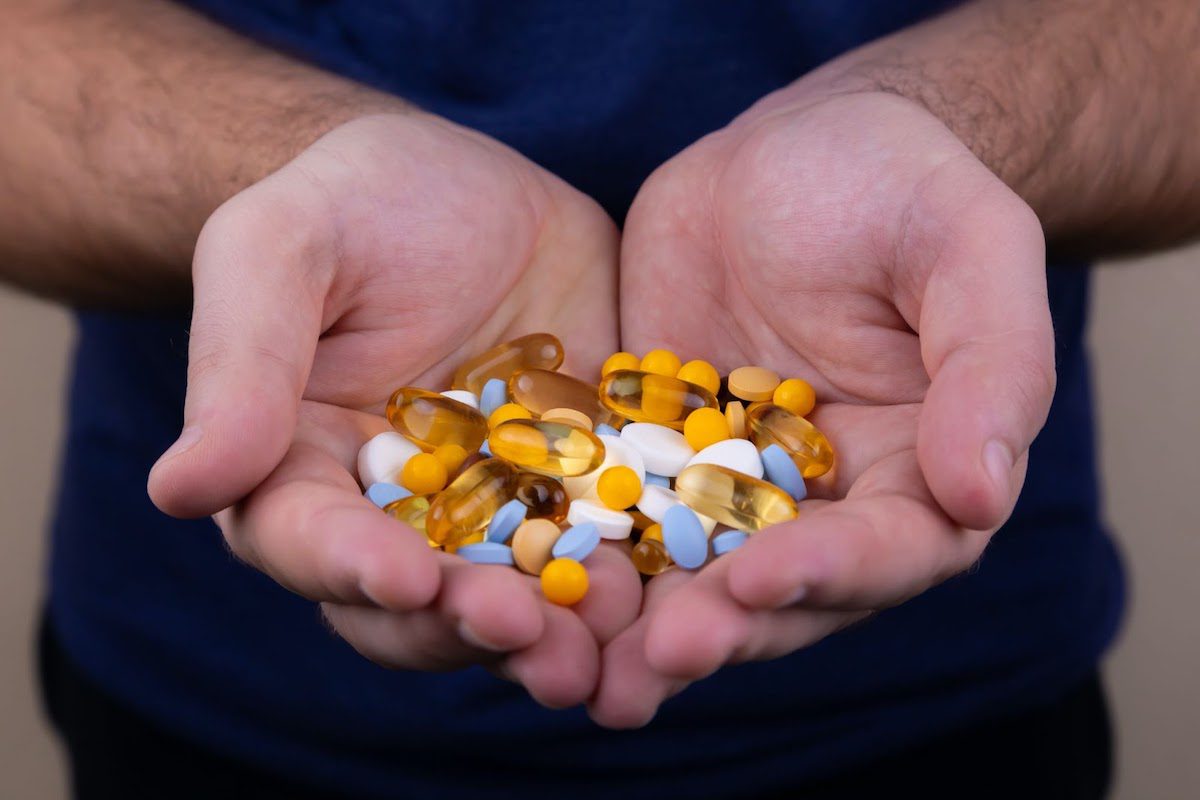
To succeed as a pharmacist , you need to attend a professional program to obtain the necessary experience as a health professional to work in clinical settings. Below is the step-by-step guide to getting into pharmacy school.
Step 1: Review The Admissions Requirements
You should start reviewing possible schools to attend from your undergraduate program. This is the ideal time to compile the required coursework listed by the schools you’re interested in. Your acceptance into pharmacy school depends on the pharmacy prerequisite courses you provide.
If you don’t attend an undergraduate college, you can take an advanced placement test to help you build the required coursework. Some of the common majors required by a majority of pharmacy schools include math, statistics, biology, and chemistry majors.
Step 2: Apply Online Through PharmCAS
Pharmacy school applications are usually submitted through PharmCAS. PharmCAS was established by the American Association of Colleges of Pharmacy (AACP), as an application service for students to apply for PharmD programs. You need to first create a PharmCAS account before you can submit your application.
Your application form contains your personal information and attachments. The attachments include evaluation, prerequisite coursework, PCAT, and official transcripts from the US or Canada. You will be required to pay an application fee to PharmCAS.
Step 3: Submit Your Supplemental Application Form
While processing your PharmCAS application, you can complete your supplemental application. The supplemental application is submitted directly from the school’s portal. It might include answering a set of questions or writing an essay, which may test your psychological fitness and knowledge of the pharmacy field.
The supplemental form also attracts a processing fee, paid by credit card. It must be submitted before the deadline. Some schools waive the application fee for students, while others have removed it from the admissions process.
Step 4: Complete the Assessment Interview
The interview stage is reserved for pharmacy school applicants who have successfully submitted their online forms. Once the admissions offices are done reviewing the applicants, you’ll receive an email invitation for an interview. If you decline the invitation, your application will be cancelled.
The interview may be held online or on the school campus. It may consist of multiple sections and a panel of interviewers composed of faculty, current students, and admissions officers. Some schools include an essay assessment during their interview. The interview questions are meant to test your oral communication skills and pharmacy fitness.
Step 5: Check the Status of Your Application
Once you complete the assessment interview, the admissions officials will review your performance and contact you if they are satisfied with the results. To check the status of your application, you can log into your PharmCAS account and click the status menu button. PharmCAS can disclose your admission offers to schools that request that information.
Some schools give a period for candidates to review and accept their admission. Once you’ve been sent an acceptance letter, you may be asked to resend your official transcripts to the school. There may also be requirements for drug tests and criminal background checks.
How to Choose the Right Pharmacy School
To find the right pharmacy graduate program for you, you have to review different schools of pharmacy with a predesigned checklist. Your checklist should contain variables such as acceptance rate, graduation rate, entry requirement, and NAPLEX rate. The NAPLEX rate is particularly important, as it tells you how well the school can prepare you to practice pharmacy.
Top Tips for Getting Into Pharmacy School
- Have in-depth knowledge of the school and program. You can boost your chances of success with in-depth knowledge of the school you applied to. Your interview and essay may require you to explain how the school can help you build the required pharmacy experience. Your response will help them determine your fitness for the program.
- Prepare for PCAT with practice tests. Take time to prepare for the PCAT if you need to write it. Although some schools don’t demand it, you might be asked to provide one if you’ve been out of school for a while. Start practicing with platforms such as Pearson Assessments and Kaplan.
- Read up on current trends in the healthcare industry. Aspiring healthcare professionals must stay informed on the latest trends in the industry. Your evaluation might include questions that test your knowledge of the industry. It’s a way for the school to determine your willingness to learn and blend into the school’s culture.
- Other accomplishments aside from your GPA. Aside from having a good academic record, your application should highlight your involvement in extracurricular activities, volunteer work, social events, and work experience. Some schools are more concerned with your potential and willingness to contribute to their pharmacy community.
- Take time to build your communication skills. Your admission process might include an essay and an interview, both of which are defining factors for your admission. You need to show your recruiter that you’re an eloquent speaker and writer. Take writing classes and courses at Coursera or Udemy to build your verbal skills.
Will I Get Accepted Into Pharmacy School?
The chances of acceptance are high, based on the research insights from PharmCAS. Most schools practice rolling admissions, which allows you to apply to several programs within the same admission period. Chances are, one or more of these schools will take you.
Is Getting Into Pharmacy School Worth It?
Yes, getting into pharmacy school is worth it if your career goals include guiding patients through the right medication and working in a professional pharmacy setting alongside other licensed pharmacists. With a pharmacy degree, you can launch a lucrative career in the healthcare industry that provides you access to great career opportunities.
From a financial point of view, you can earn an impressive salary as a pharmacist. According to the US Bureau of Labor Statistics, the pharmacist median salary reaches as high as $128,710. This salary is considerably higher than those in many other professions.
How to Get Into Pharmacy School FAQ
No, getting into pharmacy school is not very hard, as the acceptance rate is high. As long as you can build the course credits and fulfill other admission requirements, you can gain admission into a pharmacy program.
To become a pharmacist, you need to first build credit hours in an undergraduate major in a relevant study. This could take you between two to four years before moving on to become a pharmacy student. After completing your undergraduate, you need to enroll and complete a pharmacy doctorate program. This could take you between three to four years.
The best college major for pharmacy is pre-pharmacy. Other notable majors ideal for a pharmacy profession include biochemistry, anatomy, chemistry, and biology. However, if you study a general degree like math, business, English, or psychology, you can still apply for a pharmacy program.
No, pharmacists go to pharmacy school. However, if they decide to change paths later, they are well prepared to pursue the medical school path.
About us: Career Karma is a platform designed to help job seekers find, research, and connect with job training programs to advance their careers. Learn about the CK publication .
What's Next?
Get matched with top bootcamps
Ask a question to our community, take our careers quiz.
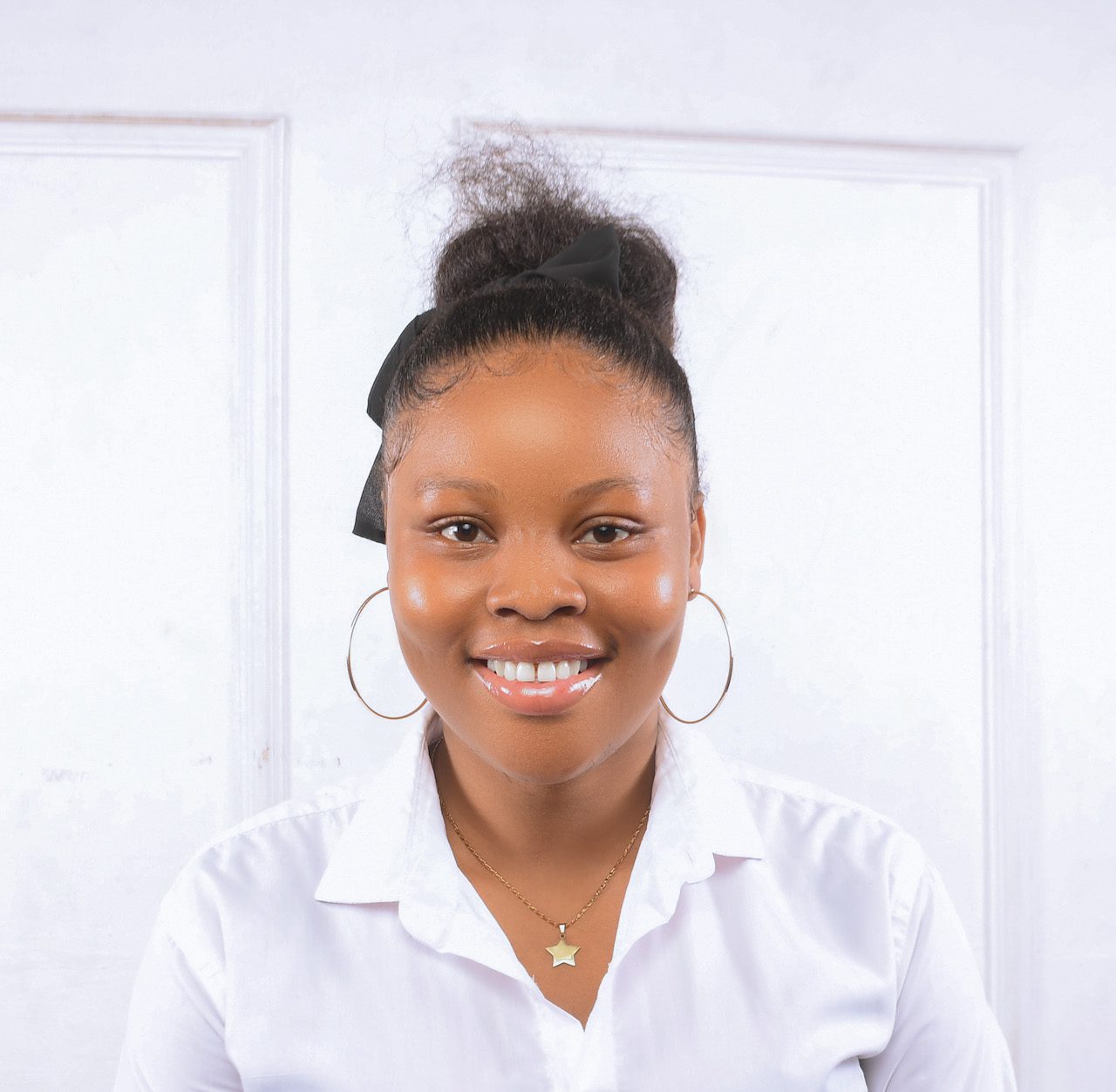
Leave a Reply Cancel reply
Your email address will not be published. Required fields are marked *

Home — Essay Samples — Economics — Pharmacy — The Importance of a Personal Statement for Pharmacy School
The Importance of a Personal Statement for Pharmacy School
- Categories: Pharmacy
About this sample

Words: 461 |
Published: Feb 7, 2024
Words: 461 | Page: 1 | 3 min read
Table of contents
Importance of personal statement, background and motivation for pursuing pharmacy, academic and professional experiences, future goals and aspirations.

Cite this Essay
Let us write you an essay from scratch
- 450+ experts on 30 subjects ready to help
- Custom essay delivered in as few as 3 hours
Get high-quality help

Prof. Kifaru
Verified writer
- Expert in: Economics

+ 120 experts online
By clicking “Check Writers’ Offers”, you agree to our terms of service and privacy policy . We’ll occasionally send you promo and account related email
No need to pay just yet!
Related Essays
3 pages / 1514 words
3 pages / 1195 words
2 pages / 727 words
1 pages / 426 words
Remember! This is just a sample.
You can get your custom paper by one of our expert writers.
121 writers online
Still can’t find what you need?
Browse our vast selection of original essay samples, each expertly formatted and styled
Related Essays on Pharmacy
In conclusion, my desire to become a pharmacist stems from a combination of factors, including the opportunity to make a positive impact on patient outcomes, the intellectual challenges and personal growth that the profession [...]
Professionalism is a cornerstone of pharmacy practice, encompassing a set of values, behaviors, and attitudes that ensure the delivery of safe, effective, and patient-centered care. The role of pharmacists extends beyond [...]
The pharmacy and drugstore industry is predominantly dominated by a duopoly consisting of Walgreens Boots Alliance and CVS Health Corporation, which make up just over 60% of the market share. Surprisingly, this industry is [...]
Are you interested in a career that combines your passion for science with your desire to help others? Look no further than the field of pharmacy. Pharmacy is a dynamic and rewarding profession that plays a crucial role in [...]
Alldaychemist is an Indian online distribution company that started out in the year 2002, it supplies great quality generic drugs and formulation to patients all around the world at a reasonable price. Their inventory is stocked [...]
For this project, Grade 10 Math Project, we have to pick something from real life that I can explain how math affects it. I chose to do my project about the Pharmaceutical industry. The pharmaceutical mathematics curriculum [...]
Related Topics
By clicking “Send”, you agree to our Terms of service and Privacy statement . We will occasionally send you account related emails.
Where do you want us to send this sample?
By clicking “Continue”, you agree to our terms of service and privacy policy.
Be careful. This essay is not unique
This essay was donated by a student and is likely to have been used and submitted before
Download this Sample
Free samples may contain mistakes and not unique parts
Sorry, we could not paraphrase this essay. Our professional writers can rewrite it and get you a unique paper.
Please check your inbox.
We can write you a custom essay that will follow your exact instructions and meet the deadlines. Let's fix your grades together!
Get Your Personalized Essay in 3 Hours or Less!
We use cookies to personalyze your web-site experience. By continuing we’ll assume you board with our cookie policy .
- Instructions Followed To The Letter
- Deadlines Met At Every Stage
- Unique And Plagiarism Free
- Business Templates
- Sample Statements
FREE 10+ Pharmacy School Personal Statement Samples [ Application, Graduate, Essay ]

Writing your own personal statement for a pharmacy school admission application is sometimes a daunting task as you have to look into yourself more carefully than you ever did to be able to get a spot in the program. Writing an essay or a statement about yourself is never easy especially that this piece of writing will determine your future and your future goal is the same thing as writing a pharmacy letter which can also help you get into the pharmacy program.
Pharmacy School Personal
10+ pharmacy school personal statement samples, 1. pharmacy school personal statement, 2. medical school personal statement, 3. pharmacy college personal statement, 4. health profession personal statement, 5. pharmacy doctor personal statement, 6. pre-pharmacy school personal statement, 7. pharmacy student volunteer personal statement, 8. medical school essay personal statement, 9. pharmacy student personal policy statement, 10. pharmacy school program personal statement, 11. pharmacy college university personal statement, how to write a pharmacy school personal statement , what is the college level examination program (clep), what is class rank, what is an articulation agreement.
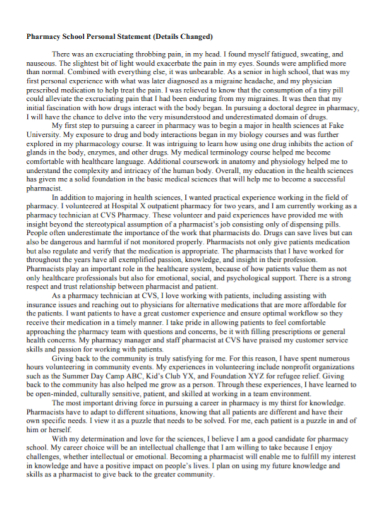
Size: 61 KB
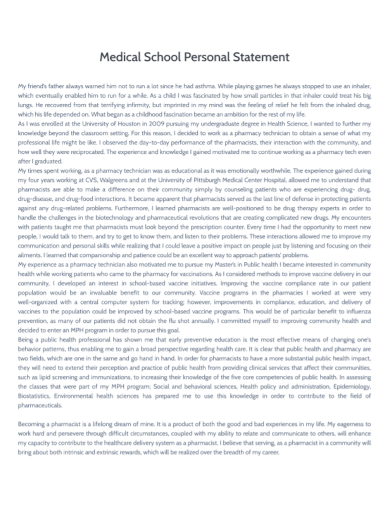
Size: 374 KB
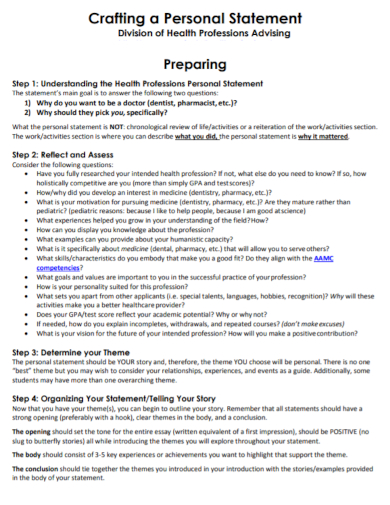
Size: 165 KB
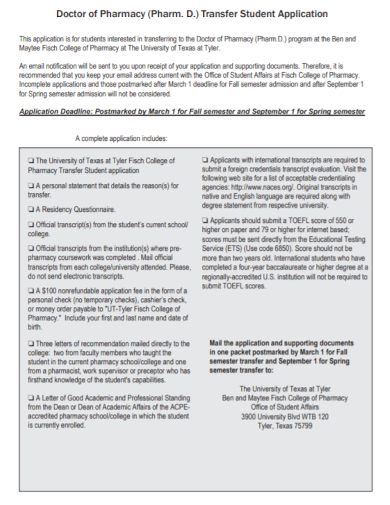
Size: 348 KB
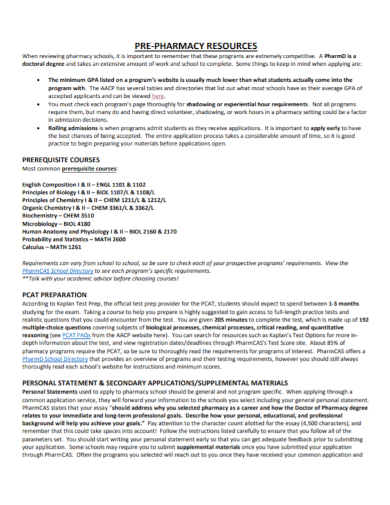
Size: 199 KB
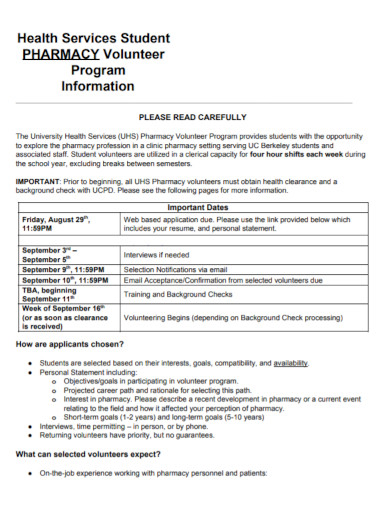
Size: 157 KB
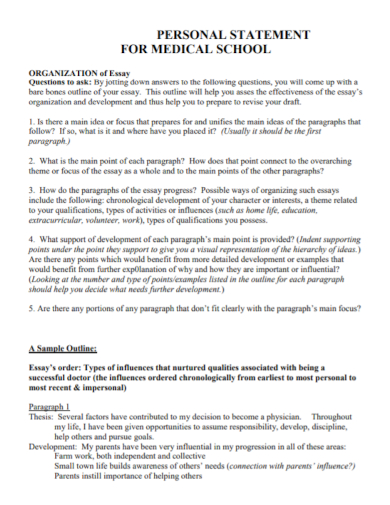
Size: 189 KB
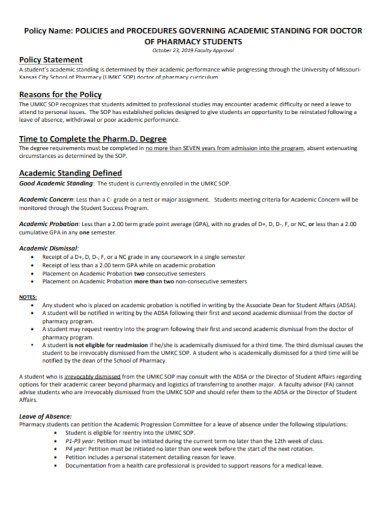
Size: 254 KB
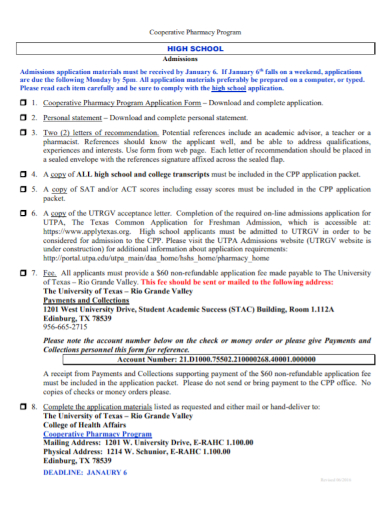
Size: 160 KB
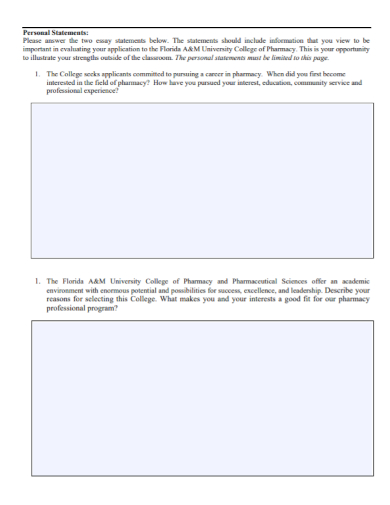
Size: 52 KB
It should include details that will make a lasting impression of you as a future asset of the department that you are applying to get into a university or college just as a university personal statement does. If you just graduated from high school and don’t know how to start with your college application to get into the pharmacy program, choose the best statement sample that best suits you from our free Pharmacy School Personal Statement Samples. Here are the ways that you must consider in your writing your personal statement .
1. There is no fixed format to writing it
One common mistake that college applicants make is that they copy the format of other successful applicants without considering first if the details that they have about themselves fit and will read well if such format will be followed after conducting a data collection about their traits. Copying the format of others will not guarantee that yours will stand out and will catch the attention of the admission counselors as people have ways of looking at things from different angles. In fact, copying from another applicant’s format will lead to creating an idea to the admissions committee that your personal statement is copied or even plagiarized. By doing that, you might be able to receive a notice of copyright infringement for mistakenly plagiarizing another person’s work.
2. Make an outline
Whatever format you decide to use, it must fit the details that you have. In order for you to determine what format to use, you must first make an outline based on the details that you have about your experiences and qualifications. Make sure that the outline includes the details that you have about yourself and not the things that others have written about because you want that impression to be yours too. These details include but are not limited to your academic history, skills and capabilities, PCAT scores, grades, and recommendations from professionals both outside and inside the school you come from.
3. Your reasons for applying
What makes you decide to apply to get into pharmacy school? There are a lot of reasons but basically, they are all about the benefits and the kind of working environment of a person with a healthcare job that inspires and hooks you up. Whatever your reason is, it should be the result of an ample amount of time you spent thinking about what you really want to achieve in life. These thoughts and decisions are translated into a document that tells about your personal statement of the reasons why you want to take the path of being a pharmacy professional.
4. Be honest and sincere
No matter how much you wanted to get into the program, it still pays to be honest when you write your personal statement. Just because others have specific qualifications that you don’t have doesn’t mean that you should also have them. Being sincere and honest will still reflect on your statement by writing it in the most natural way possible that you can tell something that is normally difficult to understand into simple ways of putting it.
A qualifying test for college applicants in which the results will determine if an applicant passed or not.
A comparison made by academic institutions to determine where your academic standing is compared with other students in the same or different program.
Two-year and four-year colleges create an agreement that makes it easier for their students to transfer credits between them. It contains guidelines pertaining to which courses get credit and which do not after going through an accreditation process.
Related Posts
Free 3+ pharmacy residency letter of intent samples in ms word, free 50+ sample medical forms, free 40+ fresher resume, free 11+ sample welcome letter, free 9+ cash flow statement samples, free 8+ sample cover letter, free 8+ sample pharmacy technician resume, free 7+ sample work reference letter templates in pdf ms word, free 61+ sop templates, free 58+ letter of intent, free 52+ sample student letter, free 36+ statement templates, free 15+ pharmacist letter templates, free 10+ sample letter of intent for university, free 5+ retail assistant cv samples in pdf ms word, free 47+ sample letter of intent, free 19 training certificates, free 12+ letter of intent templates, free 7+ sample hairdressing cv templates in pdf.
- EssayBasics.com
- Pay For Essay
- Write My Essay
- Homework Writing Help
- Essay Editing Service
- Thesis Writing Help
- Write My College Essay
- Do My Essay
- Term Paper Writing Service
- Coursework Writing Service
- Write My Research Paper
- Assignment Writing Help
- Essay Writing Help
- Call Now! (USA) Login Order now
- EssayBasics.com Call Now! (USA) Order now
- Writing Guides
How To Write A Pharmacy School Essay
Table of Contents
- Introduction
- Possible questions
When applying for a pharmacy degree, it is common for the school to request the student not only to provide them with the GPA and the recommendation letter from their school, but also a pharmacy school personal statement. The panel uses the pharmacy school personal statement from the student to better gauge whether they are candidate that they need for the program. It is important to note, that most of the time the panel or the committee in question will give more weight to the pharmacy school personal statement from the student or a letter of recommendation or even the GPA scores that they receive. As such, the student should always make sure they have the right skills required to write a pharmacy school personal statement. This is relative to the subtle purposes, the statement plays a role in securing a place in a program. Using the pharmacy school personal statement, the panel is able to get a picture of the student and understand them better. It is also used by the panel to measure the skills of the student when it comes to writing clear and coherent essays. This is a crucial ability relative to the fact that most of the students, nowadays, struggle with the ability to write comprehensive pieces to pass information. Writing about themselves, students should have an easier time developing the content and putting it in a manner that is easy to read and understand. Other than the panel getting to see a picture of the student through the pharmacy school essay, the panel is also able to assess the values the student holds. These are crucial, especially given the sensitivity of the field and the impact it has on the community at large. Getting the right candidate to take the course as such becomes a crucial element in maintaining the integrity of the field and largely the profession. The student is also in a position to explain to the panel, why they choose the course and what inspired them to pursue this line of education and professionalism. At the same time, the panel is able to gauge the weaknesses along with the strengths of the candidate to determine if they will be a good fit in the program.
Role of a pharmacy school personal statement
The personal statement thus plays a vital role in determining which of the students are eligible to join a pharmacy program. Ideally, the committee uses the pharmacy school essay, to meet the student before they are able to interact with them face to face. They are able to gauge the values the student has and the abilities that will match the requirements of the program at the bare minimum. With reference to the student, this is a platform where they can put their best foot forward and even compensate for the lack of points in a high GPA score. While a bare minimum score will get the candidates shortlisted for a chance at the pharmacy program, it is the pharmacy school essay that sets the students apart. The ability to shine a light on the abilities of the student, their values and their aspirations, is enough to convince a committee to choose a candidate with a lower score in the GPA. At the same time, it is a chance for the student to show why they have chosen the program and why they fit in with the objectives of the program. This is a crucial part relative to the fact that, it is important that the goals of the student and the objectives of the program are related, as it reduces the amount of friction. If the two are mismatched, it is likely that the program will not be effective and the student will have wasted their educational and career goals which is a failure.
Strucrure Elements
The pharmacy school essay outline is closely associated with the general personal statement. This is due to the resemblance to a personal statement, which is made of four main parts. The introduction, thesis statement, body paragraphs and a conclusion. The outline is a crucial part of the pharmacy school essay, as it acts as a guide on how the ideas are going to be organized within the essay from the start to the finish. It helps to reduce the amount of time the students take on any particular section or search for information that leads to tangential content. The level of focus required in the personal statements is high, as the student only has limited number of words to bring out their best. At the same time, the panel does not have a lot of time to try and understand what is the student explaining, when they have several hundreds of pharmacy school essays to read through and find the best in the lot.
Introduction of a pharmacy school essay
The introduction is the first part the committee is going to interact with and thus should be well written. The student should take time to prepare a quality introduction to ensure that the committee member reading through their essay continues to do it. The first part of the introduction should involve the use of a catchy phrase or statement. The statement should not sound rehearsed to put off the committee members from reading further. By creating an interest in the first sentence, the student ensures they push the panelist to read further into the essay. It is also important to make introductions, here, as the students express themselves. The rest of the introduction should then be used to highlight the values and aspirations of the candidate in their education and later on, in their career and what they hope to achieve through the program.
Body of an personal statement
- The body paragraphs are organized in a way to elaborate on the various points the student would want to make. As such, each of the paragraph will discuss its own topic.
- The first part of the paragraph should be the topic sentence. This is a sentence that gives the readers a highlight of what is discussed in the paper.
- The other sentences that follow are evidence based which support what has been introduced in the topic sentence.
- At the end of every other paragraph is a transition sentence where the student uses pharmacy school essay transition words to create continuity from one paragraph to the next.
- The transition words enhance the fluidity of the information that is contained in each of the paragraphs to match the rest of the essay and the general theme.
In the pharmacy school personal statement conclusion, the student has a chance to summarize all the points which have been mentioned in the essay and connect them to why they will be the best candidate for the position in the program.
Finalizing a pharmacy school personal statement
When finalizing pharmacy school personal statement, the student should read through their work to make sure there are no mistakes that could easily affect the professionalism of the essay.
List of possible questions on the essay presentation:
- Tell us more about yourself
- What is the greatest challenge in the pharmacy industry and what is the solution?
- Why did you choose this program?
- What are your educational goals in pharmacy?
- What has inspired you to pursue a career in pharmacy?
- Where do you see yourself in five years?
- What are your educational goals?
- How would rate the pharmacy industry in the country?
- What is the greatest challenge you have faced personally and how did you overcome it?
- What are your values in life?


- Learn About Pharmacists
- Pharmacist or Pharmaceutical Scientist
- History of Pharmacy
- Pharmacy Myths Debunked
- Pharmacy Glossary
- Road Map to Pharmacy
- Novel Pharmacy Careers
- Real Pharmacist Stories
- Why Pharmacy Is Right for You
- Which Pharmacy Career is the Best Fit for You?
- Admissions Requirements
- Getting Experience
- PharmD Program Structures
- Pharmacy Admission FAQ
- Paying for Pharmacy School
- PharmD Application Tips
- School Directory
- Submit An Event
- Subscribe to Newsletter
- Pharm4Me Materials
- Kid’s Corner

Why I Chose to Attend Pharmacy School and Get My PharmD

Meet your pharmacist, Dr. Tom Kalista! Having the opportunity to spend his career doing something that has a real-life, beneficial impact on people was what attracted him to pharmacy school (and it didn’t hurt that his mom is a pharmacist!). We spoke with Dr. Kalista to better understand, why pharmacy?
Why pharmacy?
My mother has been a pharmacist and worked in a pharmacy for as long as I can remember, so I have always been exposed to the profession. When I made my decision to go to pharmacy school, it was an opportunity to attain my PharmD, be done with pharmacy school after 6 years, and graduate into a field with sustainable, well-paying jobs—but mostly it was the chance to spend my career doing something that has a real-life, practical, beneficial impact on those I spend my time serving. Cheesy as it sounds, I get to help people and make a positive difference in their everyday lives.
What type of pharmacist are you?
I am a pharmacist who refuses to allow any priority but the patient’s well-being take precedent. When asked, “As a pharmacist, what is your job?” I can never answer any five words but, “Take care of the patient.” That is what I teach all of my students—it has to come first and foremost, or else you irreparably betray the trust placed upon you by any person seeking your counsel.
What makes your career path unique?
I would say my career path has been unique in a similar regard—no matter what setting I have found myself, it has undoubtedly been in search of a way for me to best take care of the patients I serve.
What does your work/life balance look like?
It is most definitely a balance. I will often say that I am always on the clock—in a world where any email, text, or phone call is instantly accessible in your front left pocket, it is very difficult not to be—but at the very same time I will also say I am always off the clock. When something needs to get done, it gets done, and my job demands it get done as promptly and completely as possible, but when things are not imminently pressing, I make sure I take advantage of that time as well.
Whether it’s spending time with family and friends, traveling, indulging various hobbies, or even just laying on the floor with my dog, I absolutely require that time to step away from work and recharge. Taking that break and making sure I get to do the things I enjoy allows me to then re-approach my work with refreshed enthusiasm and vigor. The balance—and the ability to properly balance all our conflicting obligations and desires—is critical.
What do you love most about your job?
Whether it’s patients or students, the very best part about my job is getting to interact and work with other people to help give them the tools to best achieve their goals and succeed.
Describe the most rewarding day of your career.
About 4 months after I started my current position, I remember a very distinct Friday afternoon. The honeymoon phase of a brand new shiny job had worn off, it was later on in the fall so the days were getting colder/shorter, and I was getting very near my wit’s end—just one of those days I needed to be over (fast). My last patient of the day came in, and I would be lying if I said I wasn’t immediately looking forward to the visit being over and my weekend getting started. By the end of the 30-45 minutes I spent with this gentleman, however, I could not have had a more drastic 180. Nothing earth-shattering occurred in terms of his therapy, I didn’t make any life-altering recommendation that completely changed this person’s world for the better, but after just meeting and talking to him, I left that day with a massive smile on my face, feeling like I could take on the world, and thinking to myself for one of the very first times in my life, “This is what I am meant to be doing”.
What most attracted you to pharmacy over other healthcare professions?
It was more of a pragmatic decision in that regard at first—6 years of pharmacy school versus 8 years for med school (not to mention residency/fellowship/etc.)—but having learned all I have about pharmacy, and being fortunate enough to have grown my career into what it is today, I could not imagine how it might’ve gone better had I chosen another healthcare profession.

To dovetail off my answer for the previous question, the breadth of opportunity that a career in pharmacy can provide is a criminally well-kept secret. I would have never imagined at 17 years old that at 28 I would have worked in so many different settings within the realm of pharmacy, and even still have countless alternative options unexplored. It is difficult to wrap your head around while still in school, but the possibilities for pharmacists—regardless of what stage you are at in your career—are truly extensive.
What’s the best advice you were given?
Best piece of advice I have ever received is “know your audience.” Whether you’re counseling a patient or teaching a class or on a job interview or anywhere in between, know who you are talking to, and, more importantly, know how they prefer to communicate. Regardless of what you are trying to convey to another person, doing so in a way most conducive to their understanding is paramount.
What is the biggest misconception around pharmacy careers?
That all we do is count pills and label the bottle in which they get put. The image of “traditional” retail pharmacy is still around, but that’s not to say that it’s entirely a negative thing. Pharmacy’s reputation has been undoubtedly built on that paradigm, and we would be misguided to dismiss or demean it. Instead, I would elaborate by saying pharmacy has evolved. The well-established value of the pharmacist is still very much intact (if not enhanced), but also the full spectrum of healthcare services a pharmacist can provide has grown substantially.
Interested in applying to pharmacy school? Check out the four things you need to do before applying.

- Privacy Policy
- Terms of Use
APPLY EASILY WITH PHARMCAS
College Reality Check
Here’s How Hard It is to Get Into Pharmacy School
The Georgetown University Center on Education and the Workforce says that the lifetime earnings of licensed pharmacists amount to a whopping $4,358,000. It isn’t surprising as training to become a pharmacist as well as the duties and responsibilities of being one are hard. And now you are wondering if it’s also hard to get into pharmacy school.
According to the latest data, the acceptance rate at pharmacy schools is 82.7%. But before gaining admission into pharmacy school to earn a Doctor of Pharmacy degree (PharmD), one must first complete an undergraduate degree for two to four years and pass the Pharmacy College Admission Test (PCAT).
It’s true that getting accepted into pharmacy school these days is almost effortless as nearly everybody who applies gets accepted, thanks to the high average national acceptance rate.
Alas, the things that you will have to go through before and after applying to pharmacy school aren’t that easy.
There are many challenging courses to pass and difficult tests to take before you can reap the fruits of being a pharmacist, such as being able to work in different settings and getting impressive financial compensation.
Continue reading if you are thinking about including a pharmacy school on your college list.
Below, we will discuss just about everything you need to know before deciding to attend pharmacy school in order to turn your dream of being a pharmacist into a reality.
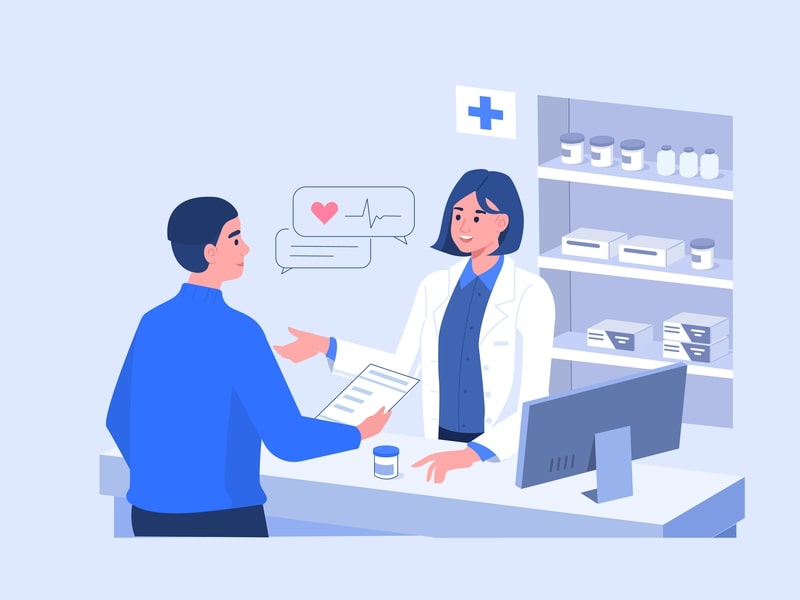
Is It Easier or Harder to Get Into Pharmacy School Now?
Now is the best time to apply to pharmacy schools for students who wish to become pharmacists. That’s because the acceptance rate at pharmacy schools has never been higher. The number of applicants accepted into pharmacy schools has increased by up to 48.6% from the academic year 2003 to 2004.
Since pharmacists are in the healthcare field, it’s easy to assume that the path to becoming one is grueling. After all, it’s the health and lives of drug-taking patients that are on the line.
Becoming a pharmacist is challenging. Becoming a student at pharmacy school, however, isn’t as challenging.
As mentioned earlier, the average acceptance rate at institutions offering a pharmacy program is 82.7%. That’s so much higher than the average acceptance rate at colleges and universities ranked by US News, which is 68%. So, in other words, it is more likely for you to receive an acceptance letter from a pharmacy school than any other school.
Refrain from assuming that gaining admission into pharmacy school has always been this easy. In the past, the majority of applicants aspiring to enroll in a PharmD program got rejected.
Here’s a table of the acceptance rates at pharmacy schools from 2003 to 2018 :
| 2003 to 2004 | 34.10% |
| 2004 to 2005 | 31.70% |
| 2005 to 2006 | 33.70% |
| 2006 to 2007 | 36.60% |
| 2007 to 2008 | 41.40% |
| 2008 to 2009 | 50.30% |
| 2009 to 2010 | 54.50% |
| 2010 to 2011 | 59.80% |
| 2011 to 2012 | 62.10% |
| 2012 to 2013 | 69.50% |
| 2013 to 2014 | 72.20% |
| 2014 to 2015 | 77.60% |
| 2015 to 2016 | 79.50% |
| 2016 to 2017 | 81.40% |
| 2017 to 2018 | 82.70% |
But just because the average acceptance rate at pharmacy schools is high doesn’t mean that you will get accepted 100% when you apply to one of them. Still, it’s a must that your academic profile matches or even surpasses the admissions criteria of the pharmacy school you wish to earn your PharmD from.
In order to be able to apply to pharmacy school, you will have to go to college first. Needless to say, you cannot go from being a high school graduate to being a pharmacy student. Being an undergraduate student first is a must in order to complete the prerequisite courses.
However, there are programs that allow you to earn your bachelor’s degree and PharmD one after the other — we will talk about this in a few, so don’t stop reading now!
Related Article: Is Optometry School Hard to Get Into?
Which Pharmacy Schools are the Easiest to Get Into?
In the US, the easiest pharmacy school to gain admission into is the South College School of Pharmacy. With an acceptance rate of 100%, anyone who applies to it to complete the accelerated PharmD program, which is accredited by the Accreditation Council for Pharmacy Education (ACPE), gets accepted.
Besides being easy to get accepted into, it’s also easy to earn your PharmD from the South College School of Pharmacy. That’s because it offers a three-year PharmD program .
At most other pharmacy schools, students usually earn their PharmD after four years.
Whether your goal is to get into pharmacy school trouble-free or graduate from it in no time, consider going to the South College School of Pharmacy. Since its accelerated PharmD program is accredited by an agency that is recognized by the Council for Higher Education Accreditation (CHEA), the PharmD you will obtain from it is legitimate.
The following are pharmacy schools in the US that are the easiest to get into , based on their acceptance rates:
| PHARMACY SCHOOL | ||
|---|---|---|
| South College School of Pharmacy | Knoxville, Tennessee | 100% |
| University of Kentucky | Lexington, Kentucky | 96% |
| South Dakota State University | Brookings, South Dakota | 90% |
| Virginia Commonwealth University | Richmond, Virginia | 87% |
| University of Arizona | Tucson, Arizona | 85% |
| University of Iowa | Iowa City, Iowa | 83% |
| Creighton University | Omaha, Nebraska | 74% |
| University of Tennessee | Knoxville, Tennessee | 79% |
| Drake University | Des Moines, Iowa | 68% |
| University of the Pacific | Stockton, California | 66% |
| University of Utah | Salt Lake City, Utah | 62% |
| Purdue University | West Lafayette, Indiana | 60% |
| Texas Southern University | Houston, Texas | 57% |
| University of Minnesota – Twin Cities | Minneapolis and St. Paul, Minnesota | 57% |
| Ohio State University | Columbus, Ohio | 54% |
| University of Wisconsin – Madison | Madison, Wisconsin | 54% |
| University of Washington – Seattle | Seattle, Washington | 52% |
When building a college list, many students check out the acceptance rate of a school before including it. This allows them to have a better idea of whether or not it’s likely for them to get accepted into it.
Keep in mind that earning a PharmD is not enough. After graduation, you will still have to take the North American Pharmacist Licensure Exam (NAPLEX) and the Multistate Pharmacy Jurisprudence Exam (MPJE). This is for you to earn a license and be able to work legally as a pharmacist in the US.
It’s due to this why choosing a pharmacy school based on its acceptance rate is not enough.
Shortlisting pharmacy schools with a strong PharmD program is also a must. To pass the NAPLEX and MPJE, having solid intellectual preparation is a definite necessity. This is why before shortlisting any pharmacy school, it’s a good idea to check out its NAPLEX and MPJE passing rates.
Here are some of the best pharmacy schools in the country these days:
| University of California – San Diego | La Jolla, California | 32% |
| University of Wisconsin – Madison | Madison, Wisconsin | 54% |
| University of Washington | Seattle, Washington | 52% |
| South Dakota State University | Brookings, South Dakota | 90% |
| University of Houston | Houston, Texas | 65% |
| Virginia Commonwealth University | Richmond, Virginia | 87% |
| University of Southern California | Los Angeles, California | 11% |
| University of Kentucky | Lexington, Kentucky | 96% |
| Butler University | Indianapolis, Indiana | 73% |
| University of North Carolina at Chapel Hill | Chapel Hill, North Carolina | 23% |
| Ohio State University | Columbus, Ohio | 54% |
| University of Tennessee | Knoxville, Tennessee | 79% |
| University of the Pacific | Stockton, California | 66% |
| University of California – San Francisco | San Francisco, California | 16% |
| University of Texas at Austin | Austin, Texas | 32% |
| University of Minnesota – Twin Cities | Minneapolis and St. Paul, Minnesota | 57% |
| Drake University | Des Moines, Iowa | 68% |
| Ohio Northern University | Ada, Ohio | 70% |
| University of Iowa | Iowa City, Iowa | 83% |
| Creighton University | Omaha, Nebraska | 74% |
One should never judge a book by its cover — some of the best pharmacy schools in the US have high acceptance rates, too, which means that being less selective doesn’t necessarily mean that the school is bad.
What Do You Need to Do Before Going to Pharmacy School?
Students who wish to attend pharmacy school should first complete an undergraduate program for two to four years. Most students who go to pharmacy schools have bachelor’s degrees. Right before applying to pharmacy school, one must take as well as pass the Pharmacy College Admission Test (PCAT).
Unlike some other college degrees, you cannot apply for a PharmD program without first completing prerequisite courses. This can be done by attending a college or university offering them for two to four years.
So, in other words, you can earn an associate degree or bachelor’s degree before attending pharmacy school.
However, it’s not enough that you complete the prerequisite courses. It’s also a must that you get a good grade for each one of them. This is to make your GPA high enough for the pharmacy school that you wish to attend. As a general rule, the more competitive the pharmacy school, the higher the minimum GPA requirement.
Different pharmacy schools have varying prerequisite courses, depending on the PharmD program they are offering. But the courses you will have to successfully complete and pass before applying to pharmacy school include:
- Biochemistry
- General Chemistry
- Human Anatomy
- Microbiology
- Organic Chemistry
It can take anywhere from two to four years to complete the prerequisite courses because some of them will have to be taken for more than just one semester.
What’s more, others have laboratory sessions. For instance, General Chemistry comes with a laboratory class. It usually lasts for two semesters, too.
Think again if you believe that it’s enough that you have completed the prerequisite courses.
Before you apply to most pharmacy schools and get accepted, too, you must first take and pass the PCAT. Short for the Pharmacy College Admissions Test, the objective of this exam, which is administered by Pearson Education, Inc., is to assess the skills and abilities needed by students in order to excel as well as succeed in pharmacy school.
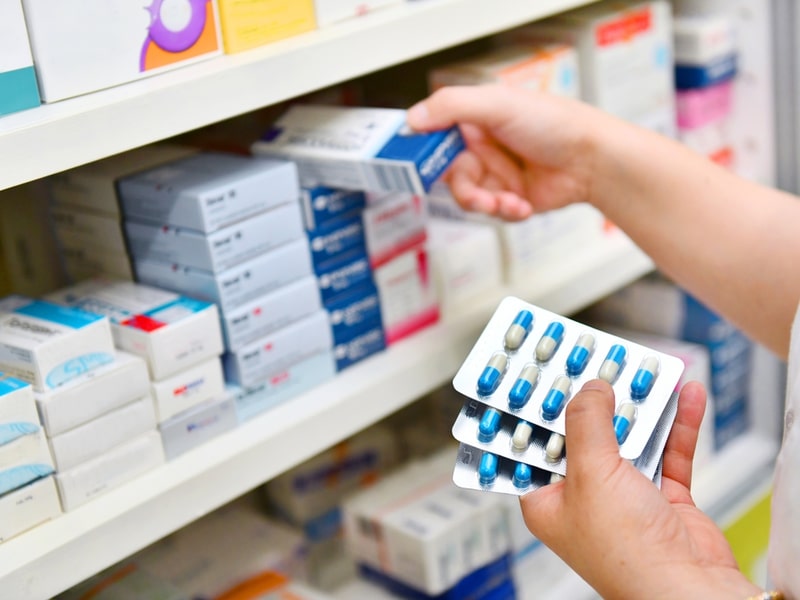
The PCAT consists of 192 questions (multiple choice) and an essay. It is scored from 200 to 600. Like the SAT and ACT, the PCAT doesn’t have passing and failing scores.
It’s no secret that, as of this writing, many colleges and universities in the US have a test-optional admissions policy. This means that they do not require applicants to take the SAT or ACT and submit their scores. However, submitted standardized test scores will be taken into account during the admissions process and impact the admissions outcome.
Some institutions are also test-blind, which means that they do not consider SAT or ACT scores at all.
Well, when it comes to the PCAT, the same thing is true — some pharmacy schools require applicants to submit their PCAT scores, while others don’t. There are also some that recommend submitting PCAT scores.
Here are some pharmacy schools and their respective PCAT requirement :
| Duquesne University | Required |
| Husson University | Required |
| North Dakota State University | Required |
| Texas Southern University | Required |
| University of Montana | Required |
| Binghamton University | Recommended |
| Howard University | Recommended |
| Long Island University | Recommended |
| Nova Southeastern University | Recommended |
| University of Georgia | Recommended |
| University of Maryland | Recommended |
| Western New England University | Recommended |
| American University of Health Sciences | Optional |
| Drake University | Optional |
| High Point University | Optional |
| Manchester University | Optional |
| Medical College of Wisconsin | Optional |
| Medical University of South Carolina | Optional |
| Roosevelt University | Optional |
| Samford University | Optional |
| South Dakota State University | Optional |
| Texas A&M University | Optional |
| University of North Carolina at Chapel Hill | Optional |
| University of the Incarnate Word | Optional |
| Virginia Commonwealth University | Optional |
| Belmont University | Not Considered |
| California Health Sciences University | Not Considered |
| Ferris State University | Not Considered |
| Florida A&M University | Not Considered |
| Loma Linda University | Not Considered |
| Massachusetts College of Pharmacy and Health Sciences | Not Considered |
| Purdue University | Not Considered |
| St. John’s University | Not Considered |
| University of Southern California | Not Considered |
| Western University of Health Sciences | Not Considered |
| Xavier University of Louisiana | Not Considered |
Is There a Way to Attend Pharmacy School After High School?
Some pharmacy schools offer a 0 to 6 program. It’s a six-year PharmD program, with the first two years consisting of prerequisite courses. Other pharmacy schools have an early assurance program. Students who complete the first two years successfully are guaranteed admission into the PharmD program.
Above, we established the fact that earning an associate degree or bachelor’s degree is important before applying to pharmacy school in order for students to be able to complete the various prerequisite courses.
But there are some pharmacy schools in the US that admit students who are fresh from high school. However, it doesn’t mean that they will be able to take the PharmD program right away.
Like the rest, they will have to complete the prerequisite courses beforehand. But the good news is that they will have to do it in pharmacy school.
Others, on the other hand, will have to complete their prerequisite from other colleges and universities.
A program that some pharmacy schools offer is referred to as the 0 to 6 program. As the name suggests, this PharmD program takes six years to complete — the first two years consist of prerequisite courses, and the last four years are dedicated to the completion of the PharmD program proper.
Refrain from assuming that opting for the 0 to 6 program will make it easier to earn a PharmD. It’s true that it can make going to pharmacy school quicker. However, it does not make it simpler.
For instance, if you fail to maintain a certain GPA and meet other requirements, you may not be admitted into the PharmD program after two years.
Then there is also what’s called the early assurance program some pharmacy schools offer. It’s just like the 0 to 6 program in that you can take it immediately after finishing high school.
What makes it different from the 0 to 6 program is that you will be considered a transferee after completing the prerequisite course during the first two years. So, in other words, you can think of the early assurance program, which some pharmacy schools call the early admission program, as a two-part way to earn a PharmD after high school.
Speaking of which, by the way, there are college preparatory classes that can help a high schooler gear up for the many challenges of attending pharmacy school. Some of them include but are not limited to:
- Literature
Just Before You Attend Pharmacy School
Unlike most other college degree programs, you cannot attempt to go for the PharmD program as soon as you obtain your high school diploma. Like many degrees in the healthcare field, you will have to complete some prerequisite courses beforehand, which is why it usually takes a PharmD program over four years to earn.
Above, we talked about how hard it is to get into pharmacy school — it’s relatively easy, depending on which pharmacy school you wish to send an application to.
Do you prefer to complete your PharmD program via the customary route, 0 to 6 program or early assurance?
No matter the case, make sure that you will devote plenty of time and attention to college so that you will be able to pass the NAPLEX and MPJE, which will allow you to work as a pharmacist in the country legally.

I graduated with BA in Nursing and $36,000 in student loan debt from the UCF. After a decade in the workforce, I went back to school to obtain my MBA from UMGC.
Similar Posts
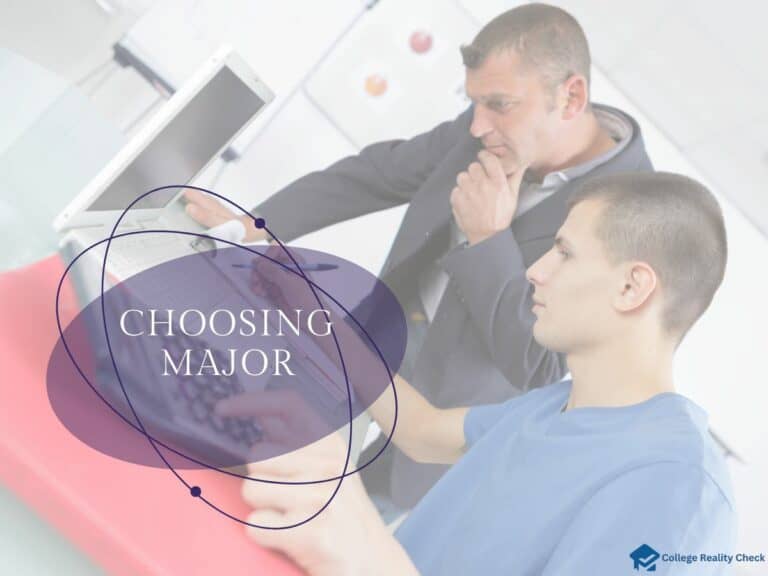
How to Pick a College Major: 6 Practical Steps

Is Film Studies a Good Degree?

What Is a Human Development Major

Queer Studies: What It Is and Where You Can Study
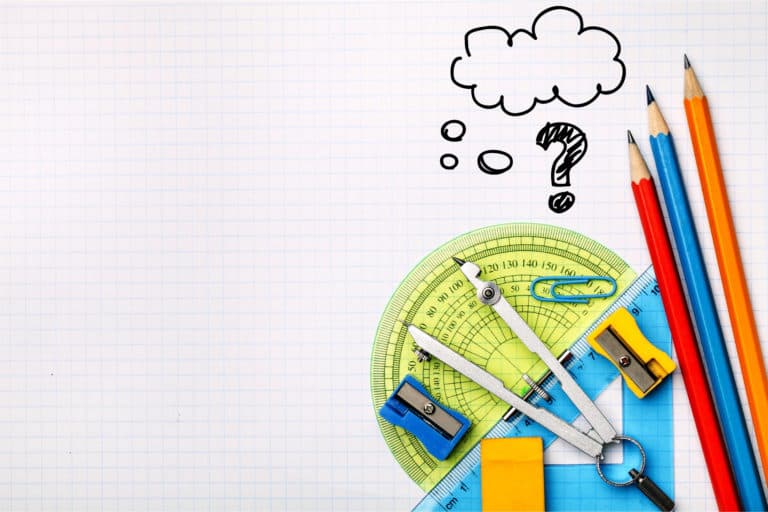
Geometry vs. Algebra: Which One Is Harder and Why

Agriculture Major: Good, Hard or Boring?
- Skip to Primary Navigation
- Skip to Main Content
Access classroom materials
Web portal to Texas A&M Services
Access your student email
Access the faculty & staff portal
Human resources portal
Popular Searches
- Where is Texas A&M University?
- What are the Aggie war hymn lyrics?
- What is the 12th Man?

- How to Apply
- Make a Gift
- Visit Texas A&M
Discover who we are at Texas A&M University and learn what it means to be an Aggie.
We strive to carry out our university’s mission and live by six core values.
We’ve compiled important facts and statistics about Texas A&M.
Our president and governing bodies guide our university.
We remember Texas A&M’s roots and celebrate its milestones.
We’ve gathered a list of common questions about Texas A&M.
Our traditions celebrate the Aggie Family, past and present.
- Rankings & Recognitions
- Global Engagement
- Campus Virtual Tour
Learn how to become the newest, loudest and proudest member of the Fightin’ Texas Aggies.
Learn how to apply as a first-time college student.
Learn how to apply as a student previously enrolled at another college.
Learn how to apply to our graduate and professional schools.
Learn how to apply if you are not a U.S. citizen.
We provided resources to help you understand Texas A&M’s costs and tuition.
Texas A&M offers a variety of financial aid, such as scholarships and grants.
- Applicant Information Portal
- Tuition Calculator
- Info for Admitted Students
Pursue your education as part of the Aggie Family. We have options for all interests, life phases and learning styles.
Texas A&M is home to 16 colleges and schools.
Our students have a vast selection of study areas to choose from.
We offer programs that enable students to learn around the world.
Texas A&M extends beyond College Station to locations across the globe.
We offer resources to ensure students’ academic success.
- Academic Calendar
- Honors Program
- University Libraries
- Course Catalogs
Make a difference at one of the nation’s leading research institutions.
Our research is making an impact around the globe.
Students have opportunities to be a part of life-changing research.
Our colleges and schools continuously work on field-specific research.
Researchers at Texas A&M collaborate to maximize their work’s impact.
Our equipment, labs and facilities enable groundbreaking research.
- Research @ Texas A&M
- Division of Research
- Council of Principal Investigators
- Research Compliance & Biosafety
- Find Funding
Discover what it’s like to live and learn in Aggieland. Our tight-knit community is rooted in tradition and service.
We have various options for parking and getting around campus.
Whether you plan to live on or off campus, we have resources for you.
Students have plenty of options for dining locations, menus and meal plans.
There is a lot to do and see in Bryan-College Station.
Students have many resources and ways to get plugged in.
We have resources and emergency services to keep students safe.
Texas A&M is rich in tradition that celebrates the Aggie Family, past and present.
- Aggie Culture
- Corps of Cadets
- Orientation
- Remembrance
Texas A&M University is the home of the 12th Man.
Texas A&M University athletics teams and programs.
Schedule of all Aggie games.
The official Texas A&M store for gifts, football gear, apparel and Aggie merchandise.
Donate to Texas A&M Athletics.
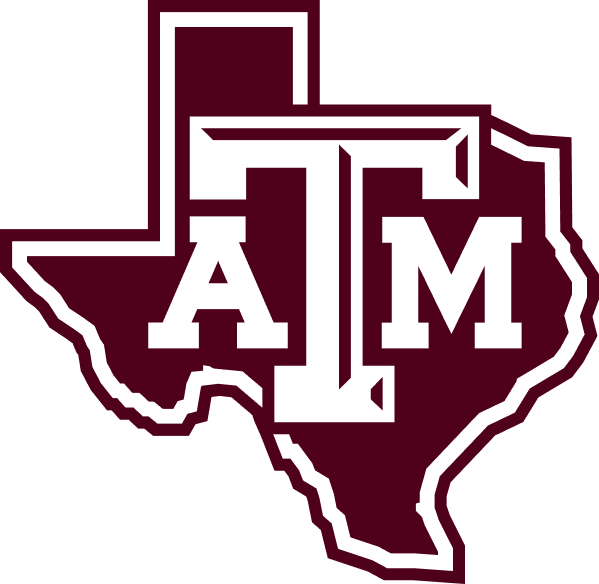
- Student and Employee Directory
- University Events Calendar
- University News
Texas A&M University is home of the 12th Man.

Irma Lerma Rangel College of Pharmacy
The Irma Lerma Rangel College of Pharmacy offers an exceptional program that prepares Aggie pharmacists through a balanced program of education, research and service. It provides students the foundation to be general practitioners with the knowledge and skills needed to provide pharmaceutical care.
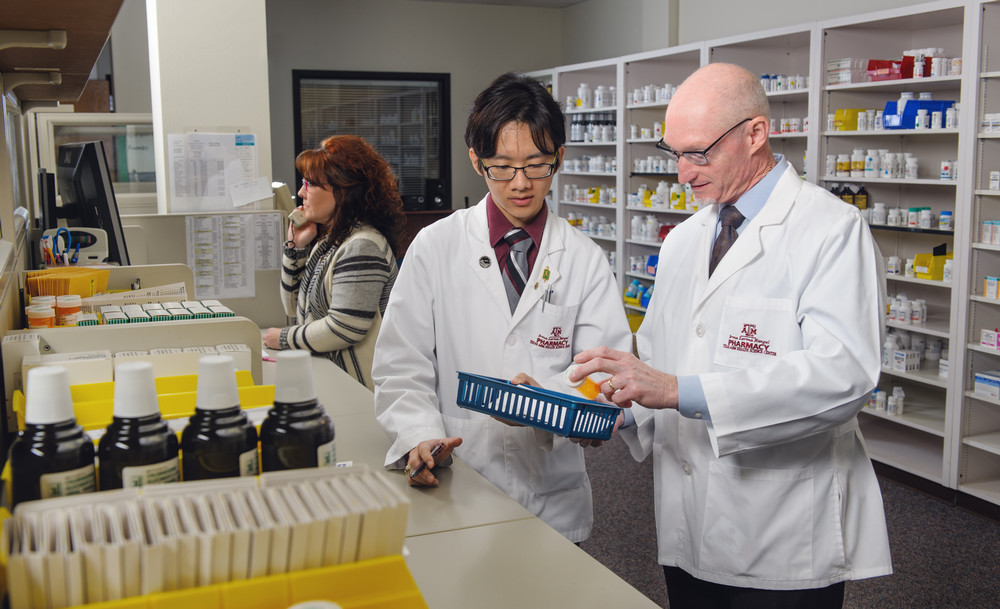
Departments
Explore the college's departments and view the faculty for each one.
| Department | Website | Faculty |
|---|---|---|
| Pharmaceutical Sciences | ||
| Pharmacy Practice |

Give to the School

From beginning to end, career services supports students

Career services , housed in the office of student affairs at the UNC Eshelman School of Pharmacy, is there for students from orientation to graduation and six months beyond as they settle into whatever is next.
“Next” for PharmD graduates can look quite different from student to student – full-time jobs, residency, and fellowships; plus, the internships and part-time jobs they experience along the way. However, the journey to get there is supported by the career services team – Sarah Pankracij, director of experiential student and career services, and Steph Olson, career services coordinator.
“We provide wrap-around support for students on anything related to their career – practically this looks like one-on-one appointments, workshops, events, and being a one-stop shop for career resources,” said Olson.
Specifically, career services run career week, a CV/resume drive-thru, mock interview week, annual networking events, and residency and fellowship prep series. They also offer support in career exploration, job searching, applications, and helping students connect with potential mentors.
“I feel very passionate about empowering students to know how to direct their careers and not be afraid to take opportunities or advocate for themselves,” said Olson.
Through Pankracij’s role, career services resources are tied into the leadership and professional development course curriculum, and she works with students while on their immersion experiences ensuring that they can utilize these specific experiences for future career opportunities.

“Something that always inspires me are the stories of these students,” said Pankracij. “When I talk to a student and really get to know them and learn their ‘why’, it’s amazing how diverse the response is for pursuing pharmacy.”
Understanding a student’s “why” is crucial for the career services team. Ultimately, the team is helping each student reach their goals, while always reflecting on the reason behind it. This is why both Olson and Pankracij agree that the best days are orientation and graduation.
“It’s a reminder that the journey is all worth it – seeing a student’s progression from orientation to graduation and knowing what they are doing next,” said Pankracij. “What’s awesome about career services is you are part of the ‘next’.”
The impact of the School’s career services team goes beyond Carolina’s walls as Olson is passionate about the larger career space and volunteers with several organizations, including the North Carolina Associations of Colleges and Employers and The Placement Exchange. Due to her passion for offering cutting edge information and resources to students and spearheading collaborations across campus, she received the Carolina Career Community (C3) Rising Star Award.
Latest News

Working to help improve health outcomes, address substance misuse in the Lumbee Tribe
READ ARTICLE >

Summer program prepares future PharmD students

School creates new financial aid role
Here Are The Colleges With The Most 2024 Olympic Medals—And What To Know About Them
- Share to Facebook
- Share to Twitter
- Share to Linkedin
PALO ALTO, CA - OCTOBER 2: A general view of Hoover Tower through the arches of the Main Quadrangle ... [+] on the campus of Stanford University before a college football game against the Oregon Ducks on October 2, 2021 played at Stanford Stadium in Palo Alto, California. (Photo by David Madison/Getty Images)
The 2024 Paris Olympic Games, which concluded this week, showcased not only the incredible talents of athletes from around the world, but also the American universities where many of them trained for their successes. From exceptional programs in swimming and gymnastics to track and field, certain colleges have consistently produced Olympians who go on to achieve extraordinary success—both during and after their collegiate careers.
Whether you hope to join the ranks of Olympic athletes or simply dream of donning your school colors and cheering your classmates on to gold, here’s what you need to know about the U.S. colleges and universities whose athletes took home the most medals in Paris this summer:
Stanford University
Number of Medals: 39
Notable Athletes: Brody Malone (Gymnastics), Asher Hong (Gymnastics), Katie Ledecky (Swimming)
What to know about the school: Stanford University is known as one of the most prestigious universities in the nation; it is consistently ranked as a top ten school by U.S. News and World Report , ranking third in 2024. But academics is not the only area in which Stanford excels. With a litany of Olympic champions, the university has made a name for itself with student-athletes. Prior to this Olympic Games, the school boasted 296 medals from 177 medalists, including Katie Ledecky , the most decorated American female athlete in history. This summer marked a record-breaking year for Stanford athletics, taking home the most medals of any university and breaking their all-time record for most medals won in a single Olympic Games.
Best High-Yield Savings Accounts Of 2024
Best 5% interest savings accounts of 2024.
University of California, Berkeley
Number of Medals: 23
Notable Athletes: Ryan Murphy (Swimming), Abbey Weitzel (Swimming), Jack Alexy (Swimming)
What to know about the school: UC Berkeley, also known as Cal, is another highly ranked institution for both academics and athletics. With an impressive array of over 300 degree programs across 15 colleges and schools, the university offers a rich and diverse environment where students are encouraged to explore, innovate, and challenge themselves—whether in the classroom, on the field, or in the pool. The school’s athletic program, particularly in swimming, has produced numerous Olympians and medalists. This year, the school sent 59 athletes to the Games and earned 23 medals; tying with its already existing record of 23 medals. This number brings the school to 246 all-time Olympic medals, with 126 golds.
University of Texas, Austin
Number of Medals: 16
Notable Athletes: Scottie Scheffler (Golf), Ryan Crouser (Shot Put), Julien Alfred (Track & Field), Kevin Durant (Basketball)
What to know about the school: Established in 1883 , UT Austin has grown into a leading public research university with a diverse student body of over 50,000 students from all 50 states and 130 countries. The university has a vibrant sports culture that has consistently produced dozens of top-tier athletes. While the university has a history of Olympic excellence, with 162 athletes having earned 156 medals prior to this summer, the Paris Olympics saw a historic delegation from the school, with 30 UT-affiliated athletes competing. UT saw particular success in Track & Field, with the talents of Julien Alfred and Ryan Crouser captivating viewers from around the world.
University of Southern California
Number of Medals: 15
Notable Athletes: Rai Benjamin (Track & Field, formerly UCLA), Anna Cockrell (Track & Field)
What to know about the school: The University of Southern California holds the record for the most Olympic medals won by any U.S. institution, having earned 326 medals prior to the 2024 Olympic Games. This summer, USC saw particular success in water polo, with USC-affiliated athletes winning gold, silver, and bronze for Spain, Australia, and the U.S.A., respectively. The Trojan spirit , characterized by a deep sense of community and loyalty, permeates every aspect of campus life at USC, encouraging students to excel not only in their academic pursuits but also in their personal, professional, and athletic development.
University of California, Los Angeles
Number of Medals: 14
Notable Athletes: Jordan Chiles (Gymnastics), Tom Daly (Diving)
What to know about the school: The #1 ranked public university in the nation according to U.S. News & World Report , the University of California, Los Angeles (UCLA) is a highly sought-after institution for its academics—but UCLA is also an athletic powerhouse, boasting 284 Olympic medals in total. In addition to the high-profile wins of Jordan Chiles (who announced her intention to return to UCLA to compete following the Olympics) and Tom Daly, UCLA also saw Olympic success in Track & Field and water polo.
University of Virginia
Notable Athletes: Kate Douglass (Swimming), Gretchen Walsh (Swimming)
What to know about the school: Consistently ranked in the Top 5 athletic standings in the NCAA and with 750 student athletes competing on 27 varsity teams, University of Virginia is a hub for excellence both on and off the field. UVA is yet another U.S. school to dominate in the pool during the 2024 Olympic Games, taking home three gold medals in the women’s 4x100 meter relay, one in the mixed 4x100 meter relay, and another in the 200 meter breaststroke. In total, 11 of the 14 medals earned by Cavalier athletes were in swimming events. Given that UVA-affiliated athletes earned 10% of the medals won for Team U.S.A. during the Games, this summer is likely to boost the university’s recruiting efforts—particularly drawing new students into the pool.

- Editorial Standards
- Reprints & Permissions
Advertisement
Supported by
The Australian Professor Who Turned Breaking on Its Head
Rachael Gunn, known as B-girl Raygun, displayed some … unique moves as she competed in a field with breakers half her age. The judges and the internet were underwhelmed.
- Share full article

By Dodai Stewart and Talya Minsberg
Reporting from Paris
Breaking made its debut as an Olympic sport Friday, and among the competitors was Dr. Rachael Gunn, also known as B-girl Raygun, a 36-year-old professor from Sydney, Australia, who stood out in just about every way.
By day, her research interests include “dance, gender politics, and the dynamics between theoretical and practical methodologies.” But on the world’s stage in Paris, wearing green track pants and a green polo shirt instead of the street-style outfits of her much younger fellow breakers, she competed against the 21-year-old Logan Edra of the United States, known as Logistx.
During the round robin, as Raygun and Logistx faced off, Raygun laid on her side, reached for her toes, spun around, and threw in a kangaroo hop — a nod to her homeland. She performed a move that looked something like swimming and another that could best be described as duckwalking. The high-speed back and head spins that other breakers would demonstrate were mostly absent.
The crowd cheered Raygun politely. The judges weren’t as kind. All nine voted for Logistx in both rounds of the competition; Logistx won, 18-0.
Online, Raygun’s performance quickly became a sensation, not necessarily in a flattering way.
“The more I watch the videos of Raygun, the Aussie breaker, the more I get annoyed,” one viewer posted on X, formerly known as Twitter. “There’s 27.7 million Australians in the world and that’s who they send to the Olympics for this inaugural event??? C’mon now!”
We are having trouble retrieving the article content.
Please enable JavaScript in your browser settings.
Thank you for your patience while we verify access. If you are in Reader mode please exit and log into your Times account, or subscribe for all of The Times.
Thank you for your patience while we verify access.
Already a subscriber? Log in .
Want all of The Times? Subscribe .

IMAGES
COMMENTS
Check Out Top 4 Sample Statements! Pharmacy school personal statement examples demonstrate that pharmacy school applications require many different documents to adequately assess you as a potential candidate. In addition to looking at your CV, transcripts, letters of recommendation, and any other required materials, most pharmacy programs ask ...
As part of your brainstorming, look at successful personal statements. Websites like Studential and ApplyToUni can give you a good idea of what spelled success for past applicants. Or, if you know anyone who went to pharmacy school already, you can ask them for their best tips. 2. Outline and Draft.
1) Determining the Narrative. When writing a pharmacy school personal statement, the most common pitfall students experience is the need for more effort placed into their writing. While your grades may be exceptional, and your letters of recommendation prove that your student-teacher relationships are healthy and you are a pleasure to have in ...
Short Application Essay for Law School. My first personal introduction to the profusion of environmental laws in our country came while working for my father. I worked for over eleven years at my father's business, an Exxon Service Center. While there, I performed every job, task, and duty associated with the operation of a service station.
Smart applicants realize they need to put 100% of their best effort into each stretch school they target. Consequently, they understand why it is better to apply to 10 schools with each application reflecting 100% of their best effort than to get stretched too thin and apply to 20 schools with each application only reflecting 50% of their best ...
Avoid clichés. Cue eye roll from the admissions committee who is forced to read hundreds of statements, many with poor attempts to use clichés or humor. Do not talk about controversial topics. The essay should be professional. Topics like religion, personal emotions, money, and politics have no place in the workplace.
Applying to pharmacy school can be complicated, but we are here to assist! ... Make sure to attend one of our Personal Statement Writing Workshops so you can get started early on your application essay. The PharmCAS application # ... You will type or cut and paste the personal statement into this section. It can be up to 4,500 characters ...
Getty. Pharmacists may not have to write many essays in their day jobs, but many of them had to write an essay to get into pharmacy school. Like any form of writing, follow the rule of showing, not telling. Give the admissions committee examples of your abilities and past successes so that they can trust you'd make an excellent addition to ...
Include only pharmacy-related experiences. 6. Avoid plagiarism. Committee members can always see through plagiarized works, so avoid this at all costs. This will only destroy your credibility in the field. 7. Avoid controversial topics. The personal statement is not a discussion ground for questionable topics.
Here are some practical tips to keep in mind when writing your pharmacy school personal statement: Start early: Give yourself plenty of time to write a strong personal statement. This isn't something that can be rushed, so start thinking about it well before the application deadline. Be specific: Don't just say that you want to become a ...
Take any constructive feedback with a positive attitude and work on bettering your final copy. 10. Display Confidence. It requires immense sincerity and self-reflection to write a pharmacy school personal statement. For your readers, to relate better to your essay, you must also consider their point of view.
Pharmacy Personal Statement Introduction No.1. I often feel like my life didn't begin at birth, but after I recovered from my accident. I was engaging in some mountain biking and trying to keep up with my friends when a wet patch of path sent me spinning over the edge of a steep hill. By the time I hit the bottom, I was in bad shape.
While in the past it was possible to become a pharmacist with only a bachelor's degree in pharmacy, a four-year Doctor of Pharmacy is now mandatory to qualify to begin a career as a pharmacist ...
to start in a pharmacy program Top 5 Identified College Majors Biology Pharmacy Chemistry Pharmaceutical Sciences Biochemistry Average GPA Undergrad GPA: 3.35 Science GPA: 3.21 Math GPA: 3.27 Age Average Age: 23 Age Range: 16-67 About Accepted Applicants Declined to State 0.1% Male 31.9% Female 67.9% Self-Identified Asian 24.0% Black or ...
Top Tips for Getting Into Pharmacy School. Have in-depth knowledge of the school and program. You can boost your chances of success with in-depth knowledge of the school you applied to. Your interview and essay may require you to explain how the school can help you build the required pharmacy experience.
Preparation is critical in assembling all your materials for a pharmacy school application. The earlier you get your materials together, the less you have to stress about an application deadline. 2. Use the PharmCAS Checklist. Checklists help keep your organized, and PharmCAS has created a great checklist in preparing a pharmacy school ...
A personal statement is an opportunity for applicants to showcase their skills, achievements, and motivation for pursuing pharmacy as a profession. It allows the admissions committee to get to know the applicant beyond their academic transcripts, test scores, and resume. A well-written personal statement can set an applicant apart from other ...
How to write a pharmacy school personal statement It should include details that will make a lasting impression of you as a future asset of the department that you are applying to get into a university or college just as a university personal statement does. If you just graduated from high school and don't know how to start with your college application to get into the pharmacy program ...
This is due to the resemblance to a personal statement, which is made of four main parts. The introduction, thesis statement, body paragraphs and a conclusion. The outline is a crucial part of the pharmacy school essay, as it acts as a guide on how the ideas are going to be organized within the essay from the start to the finish.
My mother has been a pharmacist and worked in a pharmacy for as long as I can remember, so I have always been exposed to the profession. When I made my decision to go to pharmacy school, it was an opportunity to attain my PharmD, be done with pharmacy school after 6 years, and graduate into a field with sustainable, well-paying jobs—but ...
The Virtual Pharmacy School Fair features workshops hosted by pharmacy schools, addressing topics that will provide attendees with knowledge and skills for navigating the pharmacy admission process and entering a Doctor of Pharmacy (Pharm.D.) program as well as workshops on Exploring Pharmacy Career Paths, Navigating Pre-Pharmacy Admissions, and Preparing for Pharmacy School.
The Georgetown University Center on Education and the Workforce says that the lifetime earnings of licensed pharmacists amount to a whopping $4,358,000. It isn't surprising as training to become a pharmacist as well as the duties and responsibilities of being one are hard. And now you are wondering if it's also hard to get into pharmacy school.
A "who am I" essay is a simple type of open-ended introductory essay. It is used in certain schools, workplaces and around the world to help members of a group introduce themselves through their writing. They are generally about a page long..... The five-paragraph essay is one of the most common composition assignments out there, whether for high school or college students.
The Irma Lerma Rangel College of Pharmacy offers an exceptional program that prepares Aggie pharmacists through a balanced program of education, research and service. It provides students the foundation to be general practitioners with the knowledge and skills needed to provide pharmaceutical care.
How to Start Writing a Law School Essay To get started on a personal statement, brainstorm your best stories and don't stunt the writing process. Gabriel Kuris Aug. 5, 2024
At RG Kar Hospital, which sees over 3,500 patients daily, the overworked trainee doctors - some working up to 36 hours straight - had no designated rest rooms, forcing them to seek rest in a third ...
Mariava Phillips August 14, 2024 From left to right, Sarah Pankracij and Steph Olson. Career services, housed in the office of student affairs at the UNC Eshelman School of Pharmacy, is there for students from orientation to graduation and six months beyond as they settle into whatever is next. "Next" for PharmD graduates can look quite different from student to student - full-time jobs ...
What to know about the school: Established in 1883, UT Austin has grown into a leading public research university with a diverse student body of over 50,000 students from all 50 states and 130 ...
Emily Baumgaertner spoke with state pharmacy boards, mail-order companies and more than a dozen customers who received overheated drugs. Aug. 13, 2024 Melted capsules.
Breaking made its debut as an Olympic sport Friday, and among the competitors was Dr. Rachael Gunn, also known as B-girl Raygun, a 36-year-old professor from Sydney, Australia, who stood out in ...